#good portrayal of an iconic character
Explore tagged Tumblr posts
Text
Super Mario Bros Movie Talk Part 1: Mario
I finally have the time to talk about the movie. As of right now, the plan is to break it up and talk about certain sections of the movie. I may come back and edit these posts here and there, but these posts will mostly consist of what comes to mind at the moment.
With that said, what better way than to start this endeavor than to talk about the main man himself?

The movie did a great job with Mario. In the games, Mario is this mostly upbeat character without a lot of depth. He doesn't get to have any lengthy dialogue and only says a few albeit iconic catch phrases here and there. In the movie, however, he is a determined, brave, and adventurous guy who has a huge chip on his shoulder and wants to prove himself. However, he is made to be small both literally and figuratively as not only is his height the subject of jokes, he isn't taken seriously by everyone around him including his own family.
Having said that, Mario does have his flaws. His main one is his impulsive nature. Although his heart is in the right place, he is so eager to go out and do something that he doesn't think of any potential consequences that may come from his actions. The main one that comes to mind is when he dragged Luigi into the Brooklyn sewers to try to fix the water leak that flooded the streets, resulting in both of them being sucked into a pipe that led Mario to the Mushroom Kingdom and Luigi to the Dark Lands. Him having such flaws make him more relatable rather than him being immediately being great at everything. Despite saving the day at the end, there is this feeling he still has things he needs to improve on.
The last thing I'll talk about is Chris Pratt. There was a lot of skepticism about him when he was announced as the voice for Mario, and the first trailer did very little to ease any of it. Admittedly, I was disappointed Charles Martinet wasn't going to voice Mario, although I was happy he got to take part in the movie. With that said, I wanted to see the movie first before basing my thoughts on Chris Pratt's performance, and I have to say he did Mario justice. That's not to say he was perfect, but he did enough to make Mario believable. Most important, he wasn't awful enough to make me long for Martinet. Pratt has made a living playing or voicing the everyman character roles, and who in the video game industry depicts this more than our favorite Italian plumber?
In the end, one of the main things the movie got right was the portrayal of Mario. Seeing that he's the main protagonist, it would have been a disappointment had he not been rootable. Should there be any sequels, I would be interested to see what they do with him from here.
#super mario bros movie#mario movie#mario movie ramblings#mario#good portrayal of an iconic character#more to come hopefully
25 notes
·
View notes
Text
sometimes the oversimplified queer readings of classic texts by gen Z gays frustrate me so much because you know they are not actually looking to make meaningful literary discourse at all. some of the essays and meta I read by students and lit enthusiasts here are really good, but most of them are just like "haha ophelia is hamlet's beard and getting cuckolded 🤪🤪🤪" or "omg this female character is a LESBIAN because she shows dissatisfaction with the oppressive Victorian institution of marriage!!" the worst of this has happened to Greek classic texts and Greek mythology/history in general, esp The Iliad: aka The Madeline Miller syndrome of thinking you're revolutionizing literature by saying "achilles was kind of a bisexual icon!" without reflecting AT ALL on Homeric misogyny and how it affected the portrayal of his female characters, including Helen, Briseis and- yes. yes! - the goddess Hera. Everything needs to be made Gay™ not in a way of queer art or nuanced discussions of gender and sexuality, not in the way, say, Carmen Maria Machado reads Carmilla or Kalynn Bayron reads Jekyll and Hyde, but in a uwu quirky-banter-found-family nauseatingly YA manner.
11K notes
·
View notes
Text
The Color of Hope: Ambition, Necromancy, and Black Mana
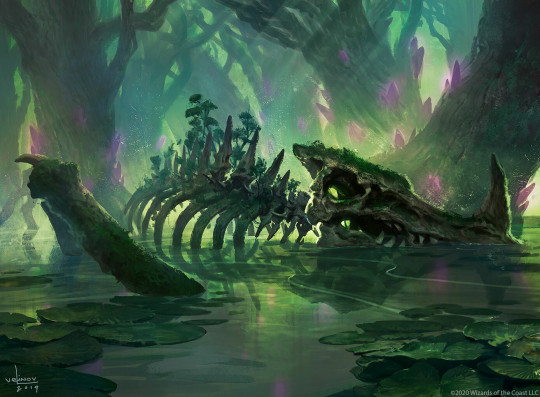
Black is one of the most misunderstood colors in Magic: the Gathering, not least because it appears on the surface to be so straightforward. Look at the most iconic black cards of Magic and you'll see deals with demons, necromancy, mass destruction and cruelty and suffering–the trappings of classic fantasy evil. Even the color's symbol itself is a skull, a universal signifier of death and danger.
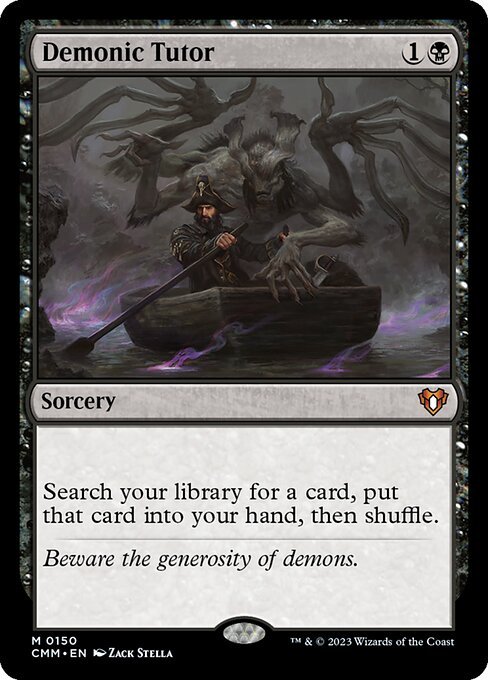
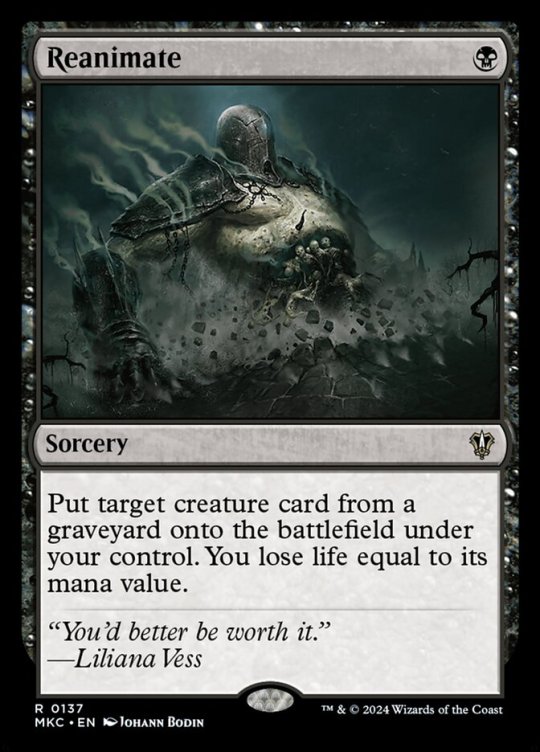
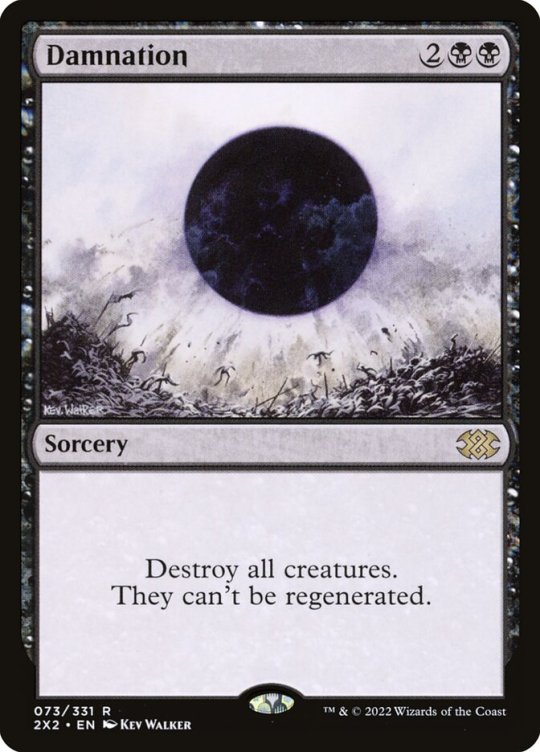
And in early Magic that seemed to be all it was. White was the color of Fantasy Good, black was the color of Fantasy Evil, and the rest of the colors were... fire magic? Elves? Whatever odd but intriguing skeleton affairs are implied by Time Walk?
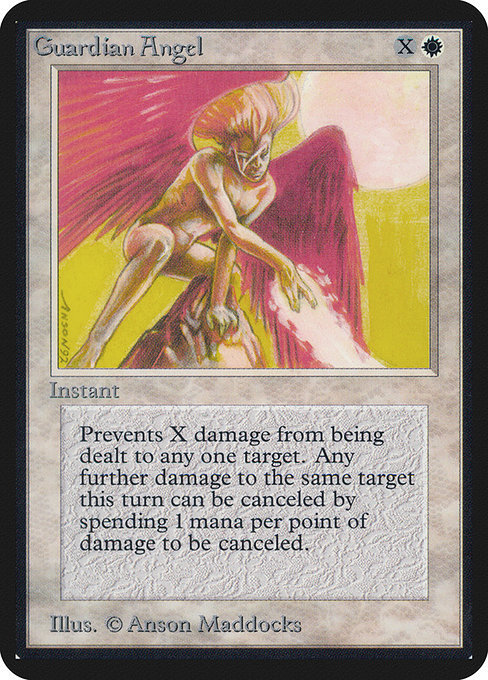
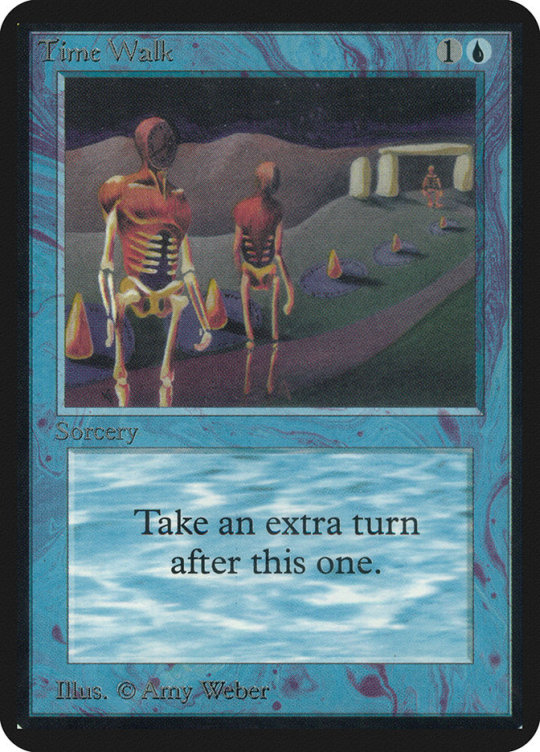
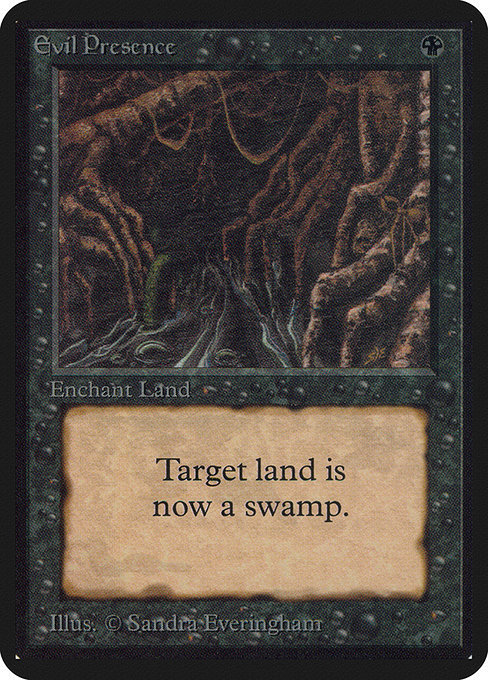
Gradually, though, Magic deepened as both a game and a storytelling medium. The color pie grew into itself as a system of complementary philosophies, archetypes whose associated aesthetics were only part of the full picture. Their arrangement around the wheel, below, is highly deliberate; neighboring colors are said to be allies with a high degree of philosophical and mechanical overlap, while colors on opposite sides of the pie are known as enemies, more likely to disagree on fundamental levels.
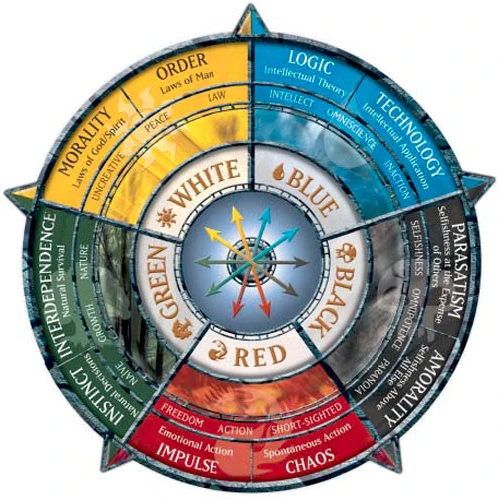
Black stopped merely representing capital E Evil and became the color of striving for power; unlike its peers, black felt that nothing, least of all morality, could prevent it from seizing what it wanted. Mark Rosewater's 2015 article about black emphasized the color's focus on the self:
"Black's philosophy is very simple: There's no one better suited to look after your own interests than you... Many costs require the sacrifice of others for your own advancement. Because it puts itself first, black is always willing to make this trade. The weak must fall for the strong to thrive." -Mark Rosewater
At its worst, black is an exploitative, amoral color that prioritizes itself at the expense of all others, allowing the "weak" to fall and scorning the very idea of compassion. Rosewater writes that black is "always willing" to trade others for itself. And these can certainly be parts of black's philosophy, when taken to its worst possible extremes, but they're far from the entire story.
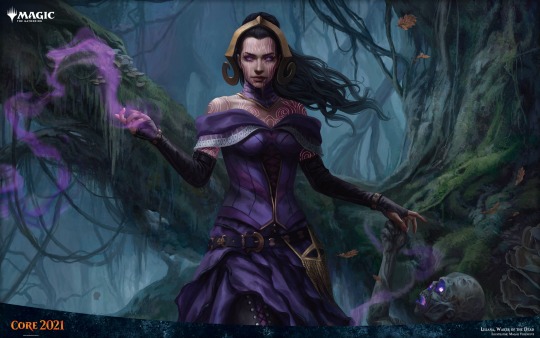
Over time, Magic's outlook on black gained nuance. Magic story introduced protagonists like the necromancer Liliana Vess, whose craving for immortality, seemingly exploitative nature, and demonic deals called back to the oldest portrayals of black–and yet she was not one-dimensionally evil. She underwent character development over the years, learning the value of reclaiming herself and standing beside others, and at no point did she become any less mono-black for it. Remember her; we will come back to Liliana and her story later.
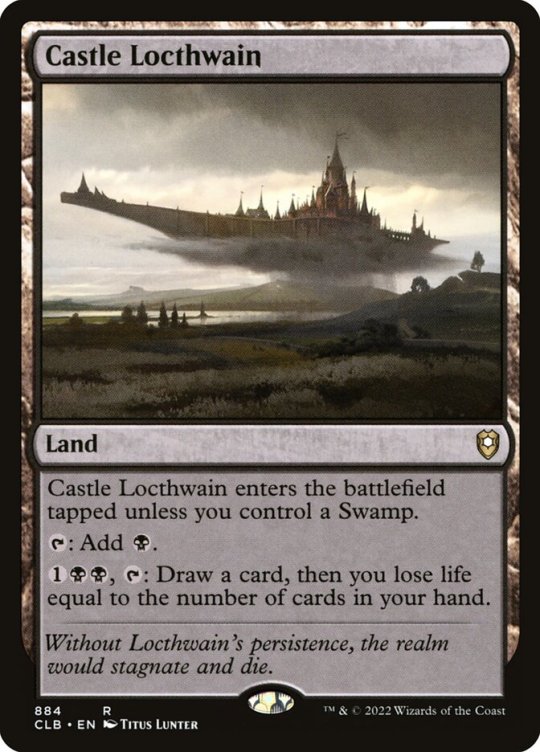
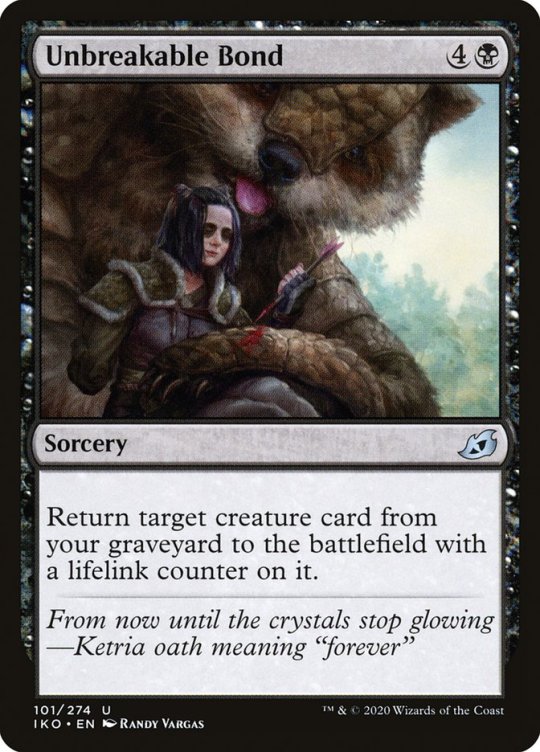
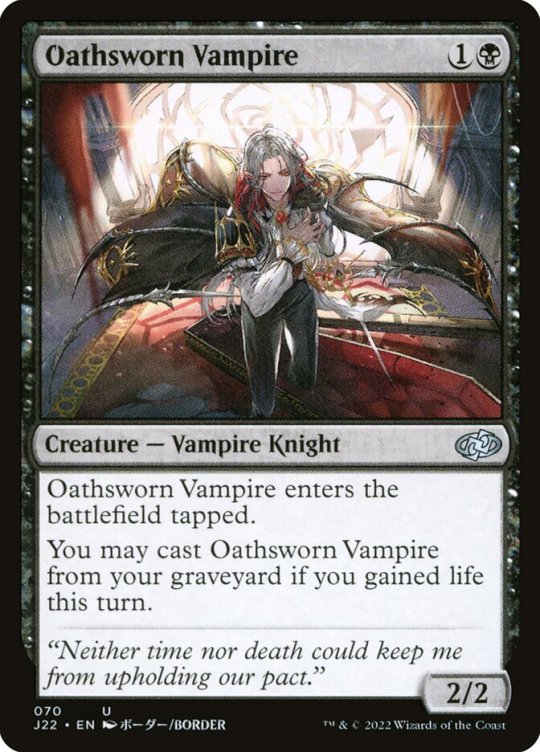
In addition to the usual death and decay, black cards began to feature a theme of relentless devotion. On the plane of Eldraine where each color represents a virtue, black's is persistence, explicitly as important as any other color. On the plane of Ikoria, the love between bonder and beast pulls Winota back from the brink of death. Wherever this Oathsworn Vampire printing is set, its flavor text is quintessentially black. It's the same self-driven attitude as before, but cast in a different light: black is nothing if not persistent when it's got its heart set on something (or someone) it cares about. Nothing, least of all the grave, will keep it down. After all, black will always come back for its own.
These newer cards uncovered the true face of black as a color capable of both great love and harm (sometimes even the latter for the sake of the former), and suggested a tantalizing new thread: perhaps putting yourself and yours first isn't all that bad, necessarily. Black is a deeply protective color; it says you don't just have to accept what you're handed, it's okay even to be furious about it (hello, ally color red), but let that galvanize you to do something about it.
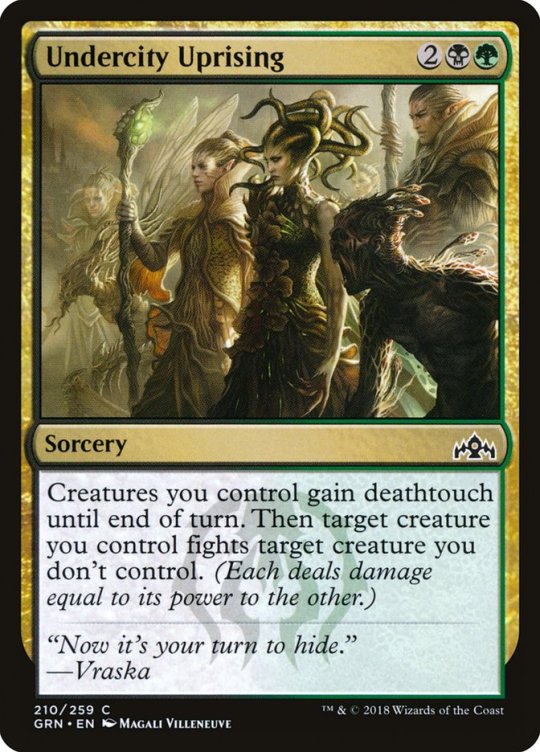
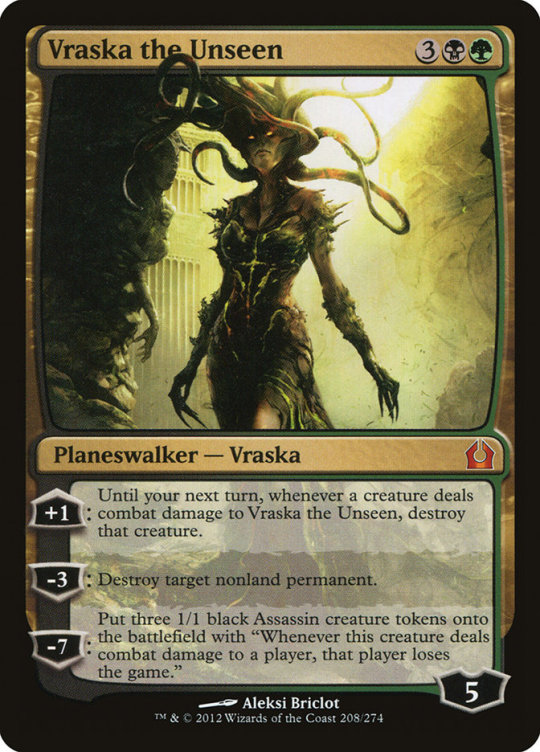
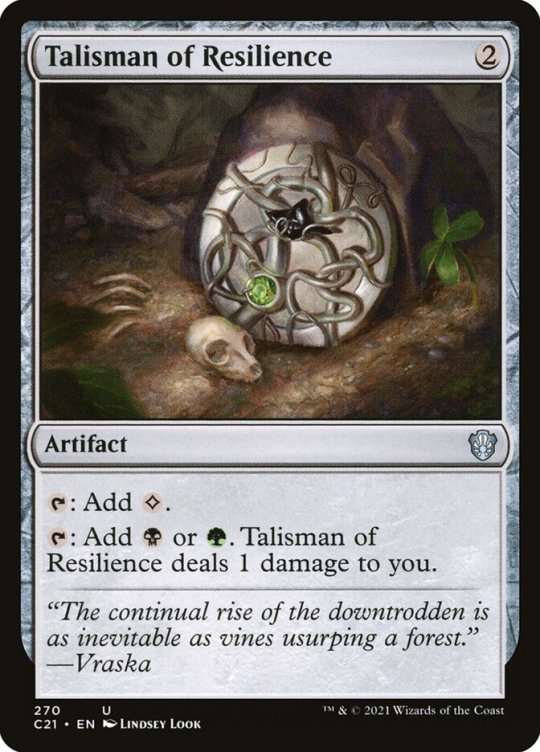
Vraska, a gorgon who faces extreme discrimination on her home plane of Ravnica, triumphs by reclaiming herself, gorgon powers and all–and even more radically, loving herself. She displays traits often considered the purview of white and green, such as a love of home and a drive to elevate the oppressed, but they are all filtered through the lens of her black alignment. Vraska staunchly refuses to deny herself or her people, the Golgari Swarm, of their value. Nor does she allow law or propriety to prevent her from championing them by any means necessary–even if that means cold-blooded murder, or aligning herself with a villain like the Planeswalker Nicol Bolas.
"[Vraska] thought of Mazirek, of the kraul, of the rest of the Ochran assassins and the malignant Jarad who reigned with casual ruin over the most downtrodden of the downtrodden. She remembered her years of isolation, and the heinous cruelty of the Azorius, and how no group deserved to suffer as much as those who would subjugate her own. Eliminating that hell was all she ever wanted." -The Talented Captain Vraska, Alison Luhrs
Like Vraska, black loves fierce and hard, willing to break any taboo for the sake of those it cares about. And it whispers, the entire way through, you are enough. You deserve better. No matter what others may say or do, you are enough.
"If I am to be met with disrespect, then I must first love myself with a fierceness no fool can take away." -Vraska in Pride of the Kraul, Alison Luhrs
Even black's "ruthlessness" isn't as fundamentally cruel as it appears, centering a passion for problem-solving (shared by its other ally blue) instead of a blunt disregard for others.
"People don’t understand the word ruthless. They think it means 'mean.' It’s not about being mean. It’s about seeing the bright, clear line that leads from A to B. The line that goes from motive to means. Beginning to end. It’s about seeing that bright, clear line and not caring about anything but the beautiful fact that you can see the solution. Not caring about anything else but the perfection of it." -K. A. Applegate
All of this comes together to make a black a color not of evil but of strength, integrity, and persistence. And that's all well and good, but I'm going to take it even further and put forward a new proposition: that black is the color of hope.
Of the nine mono-black Magic cards with "hope" in their names, all but Liliana portray black as an instrument of hope's destruction. This is, once again, black's flaw taken to its extreme–crushing others to achieve its own ends–but neglects black's own relationship with hope.

Black, more than any other color, requires hope to stay alive.
For black to persist, it must believe in a light at the end of the tunnel, a future in which its goals are realized. As long as it does, it will endure any hardship, walk through fire, and turn reality itself upside down on its way there. Primal, desperate ambition is the engine of hope that burns at the heart of black, keeping it always one step ahead of stagnation. Bitter and stubborn, black believes tomorrow will come because there is no other choice. After all, for black to relinquish hope is to let itself wither, regress, and die–an unacceptable outcome.
Thus, it is monumentally difficult to strip black of hope. That only makes it all the more crushing when it happens, when black contends with the idea that there is nothing it can do.
Black's deepest, darkest fear is helplessness.
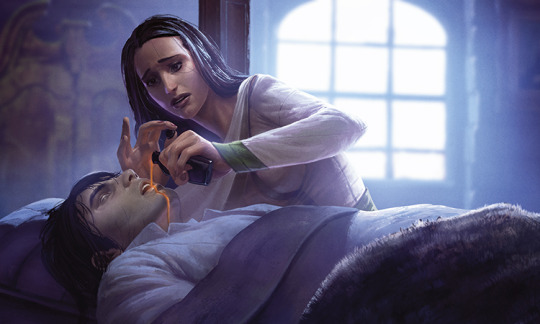
Like any mono-black character, Liliana Vess is driven at her core by a seething, desperate hope. When Liliana first unlocks her necromantic power, it is out of a sheer refusal to allow her ill brother Josu to die, even when the esis root that would cure him is destroyed by enemy witches in an undead-raising ritual. She defies her previous training as a healer, which taught her only to take the safe path, in favor of a higher-risk and higher-reward approach: stealing life from the witches themselves to restore power to the esis root she needs. It is her knowledge that her brother needs her, and her sheer stubborn will to succeed, which allows her to defeat the witches against steep odds.
"Six foes, and Liliana stood alone. But Josu's life depended on her, and the power blossoming within her was more than enough." -Liliana's Origin: The Fourth Pact, James Wyatt
Tragically, however, Liliana's attempted cure goes horrifically wrong, transforming Josu into an undead being plagued by eternal suffering. In his pain, Josu attacks Liliana. For a while Liliana holds out hope, finding the power to fight back while she determinedly searches for a spell to reverse the harm she's done. It is when she realizes this isn't possible that her strength falters.
"All this time, she had believed… that she could turn the power of death to the service of life and health. That a healer should use every tool at her disposal. But Josu was the result, a horrible fusion of life and death, and all her spells meant to manipulate the life force of the living could do nothing to harm the dead." -The Fourth Pact
Liliana learns that even her own dark magic, fueled by determination, cannot solve the problem she's created. She discovers the hard limit of her willpower, and the despair of this discovery is what causes her Planeswalker spark to ignite.
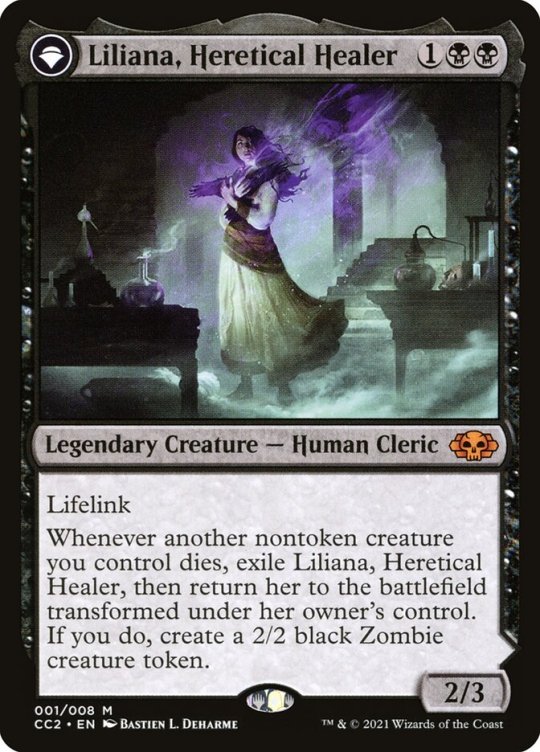
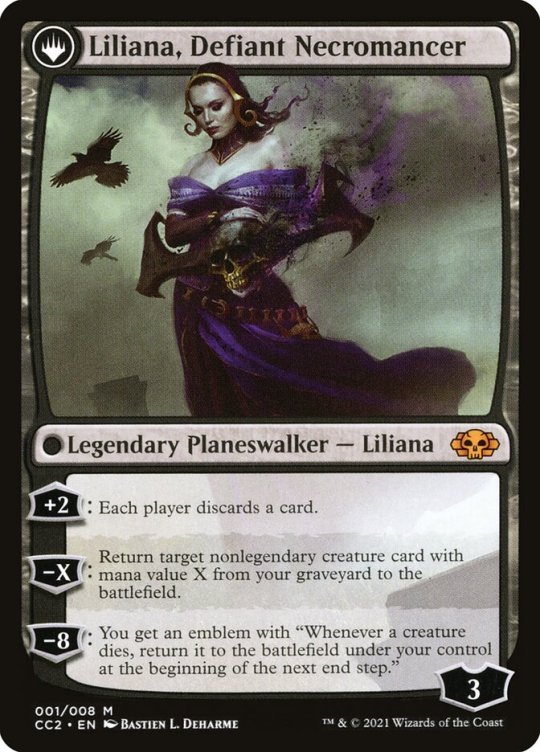
At this time Planeswalkers are as gods, immortal and near-omnipotent. Liliana spends decades enjoying this affirmation of her capability before the Mending strips her and all her peers of their power, reducing them once again to mortal mages.
"Then the Multiverse reshaped itself, robbing her—and every other Planeswalker—of the godlike power they once had wielded. Some called it the Mending, as if something broken had been repaired, but to Liliana, it seemed the opposite. It broke her beyond any hope of repair." -The Fourth Pact
Once again, it is Liliana's fear of helplessness and her refusal to accept it that drives her to push beyond the bounds of propriety–this time, to make a pact with Nicol Bolas and four demons to maintain her immortality. It is not enough for her merely to delay death; she requires the security of knowing she is fully beyond its reach, that she will never be helpless before it again as she was with Josu.
"Holding death at arm's length for whatever years are left to me? No, that's not enough. I want to be free of its shadow." -Liliana in The Fourth Pact
Black isn't like its enemy colors white and green, which are superficially associated far more often with hope. Unlike white, it doesn't believe that conviction, justice, and community will bring about rightness. Unlike green, it doesn't trust in the wisdom of the world or the natural order. Black believes that nothing will change unless you make it change; ultimately, black's self is the only one it can trust to bring about the world it needs. In addition, black lacks its enemies' idealism. Instead, it strives to be a pragmatic realist, making a final assessment of defeat all the more definite and crushing.
While white and green are more amenable to finding hope and holding it aloft as a banner, black claws hope desperately to its chest with shredded, bloody fingernails. Every ounce of hope black has, it tore by itself from the clutches of an uncaring world.
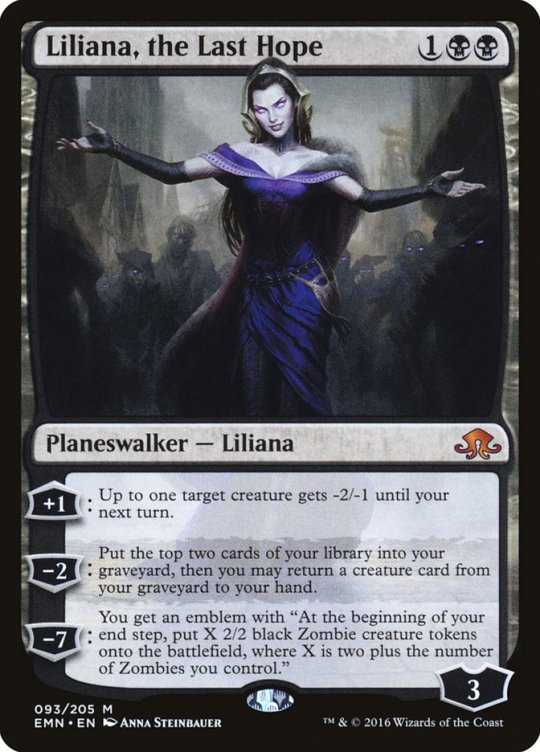
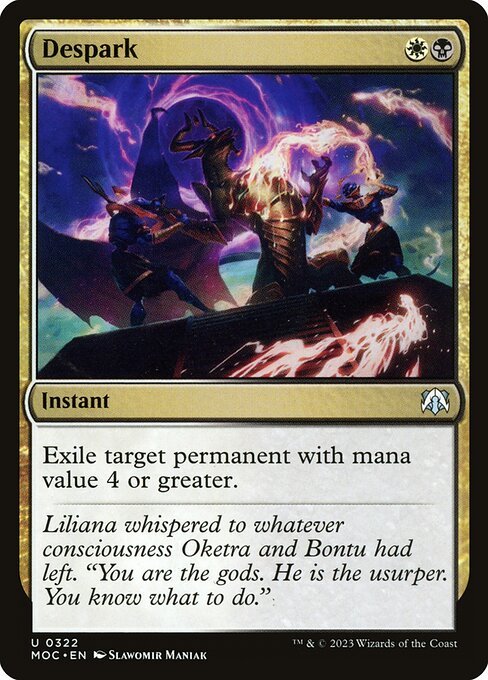
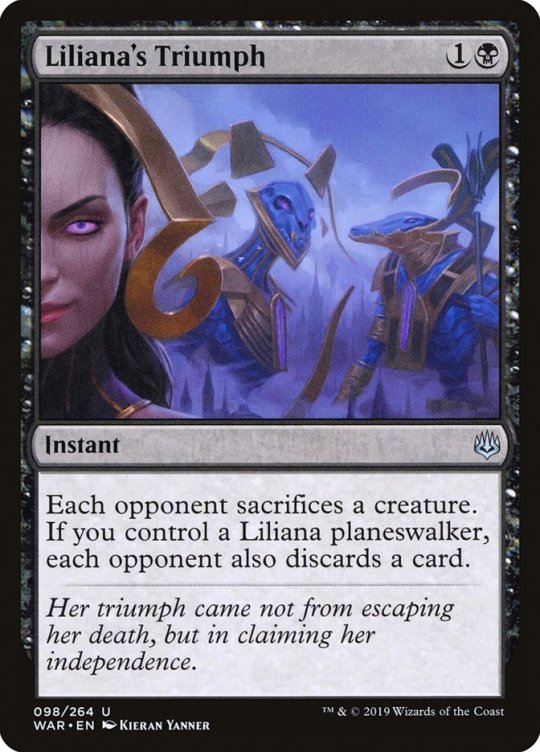
Ironically for such a self-driven color, black's fierce hope is the greatest asset it can provide to others–on its own terms, of course. It was Liliana who turned the tide of battle against the Eldrazi titan Emrakul, defiant in the face of cosmic despair. And when Nicol Bolas made his bid to return to godhood, using Liliana's necromancy to command his undead hordes, Liliana finally turned against him. In reclaiming her power, so too did she use it to free her fellow Planeswalkers from Bolas' assault. Her fear of helplessness no longer shackled her to him; agency and autonomy were hers at last.
The triumph of black, its moment of ultimate victory, is the hard-won fulfillment of its hope.
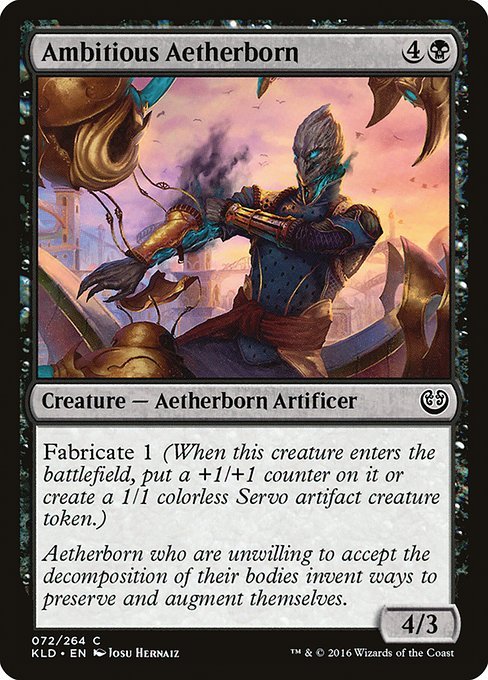
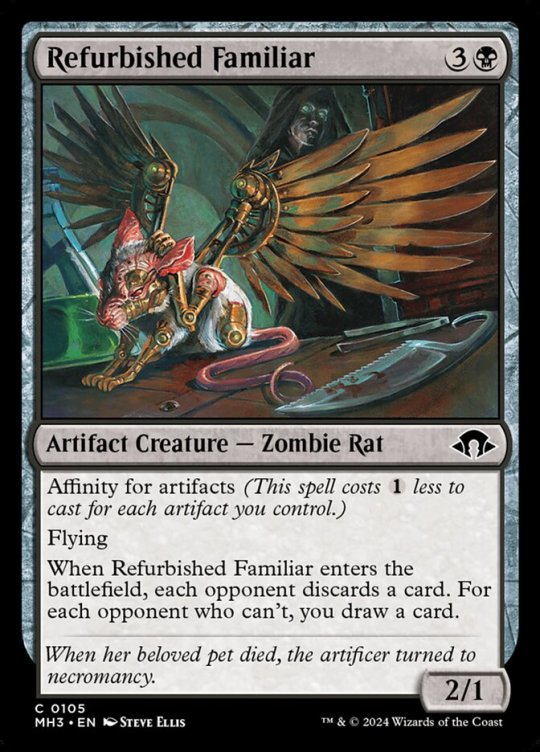
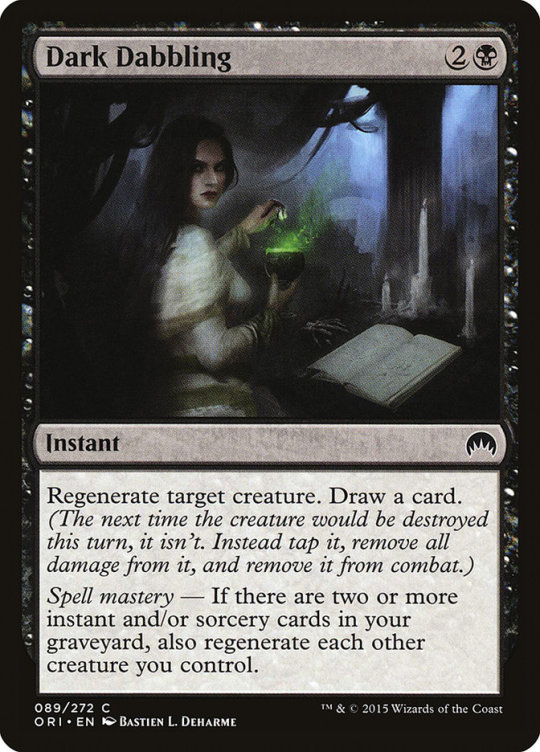
"Do not go gentle into that good night. Rage, rage against the dying of the light." -Dylan Thomas
An aetherborn, railing against the shortness of their natural lifespan, constructs a new body for themself with their own bare hands. An artificer's grief over her lost companion causes her to push invention to its limits. A young girl who loves her brother calls on the darkest of powers to save him. As it turns out, necromancy–that original thematic keystone of black–is only one of black's many, many refusals to let go of love and hope once it has them, even in the face of the ultimate end.
Time and time again, black–in love with life, ablaze with hope–looks the Grim Reaper in the eye and tells it: "Not today."
#mtg#magic the gathering#color pie#black mana#liliana vess#vorthos#literary analysis#war of the spark#magic origins#planeswalker#nicol bolas#vraska#necromancy
926 notes
·
View notes
Text
A (Negative) Analysis of Tom Taylor's Nightwing Run - Introduction
Introduction Who is Dick Grayson? What Went Wrong? Dick's Characterization What Went Wrong? Barbara Gordon What Went Wrong? Bludhaven (Part 1, Part 2) What Went Wrong? Melinda Lin Grayson What Went Wrong? Bea Bennett What Went Wrong? Villains Conclusion Bibliography
I want to start this essay by admitting I’m actually embarrassed by its length. Why did I spend so much time on something I dislike? The truth is, I did not begin this with the intention of creating such an extensive, formal study of the Tom Taylor and Bruno Redondo’s Nightwing run and how it reflects the wider problems with DC’s handling of one of their most iconic characters. I was just trying to organize the thoughts that came up during discussions with other Dick Grayson fans. Before I knew it, I had enough material, enough desire to challenge myself, and enough frustrations to vent to properly create this monstrosity.
I did not begin this Nightwing run determined to hate it. In fact, I was ready to love it. As Taylor promoted the run before the first issue was officially released, I was so excited for it. As I read short interviews where he discussed Heartless, I could not wait to have a new, incredible villain. Foolishly, I believed Taylor when he said he loved Dick Grayson.
Needless to say, I was disappointed. Then frustrated. Then angry. The beginning of any story is a period where writer and reader form an indirect bond, and as the story progresses, so do the highs and the lows of said relationship. As such, a reader’s tolerance for negative factors will either increase or decrease depending on their experience up until that point.
In other words, if the writer fails to earn the reader’s trust and instead takes their attention for granted, even seemingly insignificant details become irritating in a way they would not be if presented in a better story. In such scenarios, the reader can no longer overlook those minor moments because there’s little good to balance them out with. It is a death by a thousand cuts.
In the case of Taylor and Redondo’s run, along with those thousand cuts are also broken bones, internal bleeding, head trauma, and severed limbs. A weak plot, simplistic morality that undermines the story’s stated themes, and, most importantly, a careless disregard for Dick Grayson and everything he stands for utterly destroyed my enjoyment of this series.
It is still too early to tell what sort of impact Taylor’s (as of time of writing, still unfinished) run will have on Dick Grayson’s future portrayals. But just because we cannot predict its long term significance, it does not mean we cannot critique it. Currently, we simply lack the benefit of hindsight.
If this essay were to have a thesis, then it is this: Tom Taylor and Bruno Redondo’s Nightwing not only fails to tell a compelling Nightwing story, but it also exemplifies a cynical, self-serving, and shallow approach to storytelling that prioritizes creating hollow viral moments to boost the creators’ own online popularity over crafting a good story, honoring the character in their care, and respecting his fans – fans who have, historically, often been women, queer folk, and other individuals who felt othered by a cisheteronormative patriarchal society. Taylor and Redondo’s thoughtless and superficial narrative not only undermine the socially progressive ideals they supposedly care for by propagating a cisheteronormative patriarchal worldview, but they also demonstrate a lack of love and understanding for the character in their care. At best, Taylor and Redondo have no interest in getting to know Dick Grayson, nor any respect for their predecessor and their contributions to this character. At worst, they despise Dick so much that they wish to reinvent him into something completely different, tossing away everything that was special to his fans in order to appeal to a readership that never cared about Dick Grayson.
I structured this essay so that, hopefully, each part will build on the ones that came prior. Naturally, because all aspects of a story are interlaced, there will be overlaps between each of the sections. As it may have become obvious from this introduction, I’ll be focusing primarily on the writing of this run. That is not to say that I will not address the art, but writing is the field I know most about, and so it feels only fair to focus my critique on that.
I hope that by the end of this essay, I will have successfully proved that this run’s mishandling of different narrative elements betray a cynical appropriation of progressive ideology and a disregard and disinterest in what makes Dick Grayson so special to so many people. This is an attitude that is present within DC Comics’ current ethos as a whole.
Now, who is this essay for? Honestly, it’s probably not for Tom Taylor fans. I do not believe I’ll be persuading anyone with my writing, and, to be quite honest, neither would I say I wish to do so. Taylor and Redondo’s run has won numerous awards and has many dedicated fans who adore it for what it is. If that is you, then I’m glad. I wish I could be among your numbers. I wish more than anything that I could love this story. But I do not, and I know many others agree with me, and it is to them, I think, that I’m speaking to. As Taylor’s run is praised to heaven and back, I needed a safe space to voice my thoughts. This essay became this safe space. And to others who also feel unseen by the constant praise this run is getting, I think this could speak to you, as well. To be cliche and cringe, this will hopefully let you know that you are not alone.
Finally, I want to acknowledge some people whose thoughts greatly contributed to the creation of this essay. For around three years now I’ve been having wonderful interactions with other Dick Grayson’s fans, and those discussions were not only incredibly fun and cathartic, but also provided great insight into what needed to be included in this essay. My best friend especially gave me a space to vent when I got frustrated, and my original outline borrowed a lot from the messages I sent her, as well as notes I took for our discussions.
I’ll also be directly quoting four different Dick Grayson fans (identified as Dick Grayson Fans A, B, and C in order to allow them to keep their anonymity). Their analyses were so critical to the formation of my thesis and for a lot of what will be addressed in this essay that I actually feel like they deserve co-credit in this essay. Dick Grayson Fan B especially deserves a shoutout in helping me track down a couple of pages used as supporting evidence, as I knew what pages I was looking for but was having a hard time remembering in which issue they were located. I’m quoting them with permission, and crediting their ideas and contributions whenever relevant.
Now, without any further ado, let’s get started.
742 notes
·
View notes
Text
How your disabled character's allies react to their disability can make or break the representation in your story: Writing Disability Quick Tips
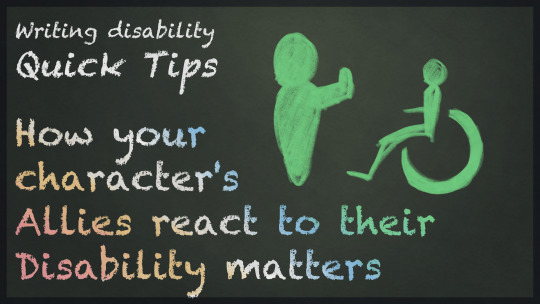
[ID: An image with “Writing Disability quick tips: How your character's allies react to their disability matters” written in chalk the colour of the disability pride flag, from left to right, red, yellow, white, blue and green. Beside the text are 2 poorly drawn people icons in green, one is standing with their hand up to the face of the other, who is in a wheelchair. /End ID]
Something I brought up in my big post about Toph Beifong was how the other characters reacted to Toph pointing out that things were not accessible to her and setting boundaries regarding her disability, which were ignored. I had more to say about it than I thought I did, as it turns out (when isn't that the case lol) but I feel like this is an important aspect of disability representation that is all too often over looked.
You can write the best, most accurate portrayal of a specific disability ever put to screen or page, but it won't mean much if all the other characters, specifically those we're supposed to like and empathise with, treat your character terribly for being disabled and having needs relating to said disability, especially if the story justifies their behaviour.
You see this most often with autistic characters and especially autistic-coded characters. The character in question will be given a bunch of autistic traits, most often traits relating to not understanding certain social dynamics or sarcasm, and when they get it wrong, the other characters we are supposed to like jump down their throat, tease them or outright abandon them. Autism isn't the only disability that gets treated this way, but it is one of the more common ones that get this treatment. It doesn't matter if you do everything else right when creating an autistic character if the other "good guys" constantly call them annoying, get angry at them or laugh at them for the very traits that make them autistic, or for advocating for their needs.
Likewise, if you have a leg amputee character who is otherwise done well, but is constantly being criticised by their allies for needing to rest their legs or taking too long to get their prosthetics on, it undermines a lot of the other work you've done. Same goes for having a wheelchair user who is accused of being a bore or a stick in the mud because they point out the places their friends want to go to on a group holiday have no wheelchair access, or a deaf character who is accused of being entitled for wanting their family to learn to sign, or anything else.
This isn't to say you can never have moments like these in your stories, but its important to remember that a) people with the same disability as your character will be in your audience. If you spend a whole season of your TV show shaming your autistic character for real traits that real autistic people have, they're not exactly going to feel welcome and may not want to hang around. b) it's going to very, very heavily impact people's perceptions of your "heros" who do this, especially in they eyes of your audience members who share the character's disability or who have had similar experiences. This isn't like calling someone a mean name or being a bit of a dick when you're sleepy, it's going to take a lot to regain audience appeal for the offending character, and depending on exactly what they do and how frequently they do it, they may not even be able to come back from it at all. And finally, c) there should be a point to it outside of just shaming this character and saying the other guy is an asshole. Like I said before, you're character is criticising real people's real disabilities and the traits or problems that come with them, things that they often have no control over, it shouldn't be used as a cheap, quick way to establish a quirky enemies to lovers dynamic or show that one guy is kind of an ass before his redemption arc. If you really must have your characters do this, be mindful of when and how you use it.
#Writing disability with Cy Cyborg#Quick tips#Disability#Disabled#Disability Representation#Writing Disability#Writing#Writeblr#Authors#Creators#Writing Advice#Disabled Characters#On Writing
752 notes
·
View notes
Note
Winnick will come this close to writing a good, rightfullly angry character with BPD/CPTSD and ruin it by making him his conception of "a dangerous psychopath" because dc's understanding of mental illness begins and ends with the joker.
I like that Jason was angry i'm not gonna lie I enjoy the "bad victim who doesn't accept that they were a necessary sacrifice, who doesn't think what happened to them is something they should be expected to tolerate, like fuck your greater good, you weren't there, it isn't worth this." I think even looking at Jason's past before getting adopted he has reason to be angry, like he is poor af and starving and he had to take care of his mom and his dad is in jail because he couldn't see another way to provide and he gets trafficked -he has so many reasons to be angry. And he's not, and I love jaybin, but I think there are so many ways and things he can be angry about without it feeling classist. And I love that he can't emotionally regulate, that he has so clearly BPD/CPTSD because why the fuck would he not, have you seen his life (and that's not even counting the csa hc, which i am because willfully and consistently implying csa and then not addressing it/denying it feels like feeding into a culture of taboo that ruins lives and getting away with covert victim-blaming at the same time). The issue is that they lack finesse or any kind of understanding of anger. The think anger is a personality trait. They think angry = evil. They think being angry means you're violent at and about everything, that you shoot indiscriminately even though you've known better since you were a kid, that you're suddenly treating women like shit (which, wtf seriously) which okay maybe THEY treat women shitty for no reason when they're angry, but that'd be more of a them problem I'd say. Their portrayal of anger is classist because their conception of emotions hasn't evolved since fucking Descartes. Think anger = bad = poor and not only doesn't it occur to them that this is classist, they so instinctively assign moral value to the concepts of poor and angry that they don't realise it and just conceptualise poor=angry and end up with incredibly classist portrayals of anger. You can write characters that are mentally ill and violent without being ableist, you can write characters that are poor and angry without being classist, but that requires a level of respect for people, introspection, humility willingness to learn about the sensitive topics you are exploring that is simply not accessible to Winnick and so many other dc writers.
And here comes my very hot take that I'm too cowardly to say off anon: the pit shouldn't have healed Jason's malnutrition. Like, outside of canon I love big jay, I love big men who are emotionally vulnerable and need comfort etc. but in canon? It just comes off as another way to adultify Jason, and make the horrible things that happen to him acceptable. Jason "sleeping with Talia because he is fucked up about Bruce" because they both look like adults until you realise this is actually just rape and you can't put any responsibility of Talia taking advantage of the kid under her care (very ooc of course) on the child himself. Jason fighting Mia looking like a 40 years old beating up a teenage girl when they're the same damn age. Fucking Ethiopia 2.0. And Jason's murders as well, for the matter. Like don't get me wrong the duffle bag of doom is an iconic villain move, but it's just that: a massive shock effect and a "psychopathic" move. We shouldn't need Jason beheading anyone to be horrified, because just one murder, if written correctly, should be enough. A child killing someone is a terrible thing. A child being put in a position where they think killing someone is the only solution to ending suffering (thinking about the Garzonas case) is a terrible thing. A kid trying to kill his murderer (because fuck his death has to matter it has to) and only begging to be allowed it should be horrifying. Jason, with his unhealed malnutrition making him look a couple of years smaller and younger than his physical age, should look his mental age. It should be impossible to look away from the reality of what he is: a traumatized teenager who wasn't allowed to grow up. And he has a gun. This is already a horror story.
Make utrh!Jason a villain if you must, but have the guts to sit with it. Don't shove the fact that he was a hero and a victim under the rug because it's uncomfortable. Sit with the unease that sometimes someone is doing something bad and is suffering a lot, and maybe they're doing the bad thing because they don't know how to survive the suffering, and suddenly it's not easy separating hero from villain from victim. Your imaginary lines in the sand will not protect you from the crude reality of the complicated and shitty situations you have chosen to depict; you open the can of worms now you can't look away and let the worms roam free just because you're squeamish.
How does it feel to be psychic and be in my head and write part of my essay on Jason for me? Fuck, I have so much to say about this but I need a good night of sleep to formulate it correctly. Look for a longer answer tomorrow, but in the meantime, everyone sit down and look at this and look at it hard. Thank you.
#thank you to you too anon#I've ranted to my wife about this for the whole day bc I had feelings about it#I'll try to articulate them in text tomorrow since it's almost midnight#but yes HARD AGREE#dc#dcu#Jason Todd#Red Hood#Jason Todd meta
206 notes
·
View notes
Text
Of Lust and Sex on Tolkien lore: Sauron x Galadriel in “Rings of Power”
Many fellow fans have complaint there’s a trend among the Tolkien fandom to de-sexualize Galadriel, but folks, this is not exclusive to her character. This is, actually, an on-going theme on how many see Tolkien’s world and work, in general, and it runs deeps.


There’s this weird headcanon that, just because Tolkien was catholic and a “gentleman”, the world he built is somehow devoid of sexuality or sexual matters, and asexual in itself. Nothing wrong with that, except we have countless examples of “sexual stuff” happening in the legendarium, from characters lusting after each other, to actual sexual assault. Just because Tolkien didn’t write explicit sex scenes (let’s say like George R.R. Martin, who devoted himself to try subvert Tolkien) doesn’t mean is not there. Not everything needs to be “in your face” meaning explicit.
Firstly, Tolkien cared enough about sexuality to write several essays on the matter, namely about the Eldar sex culture and customs. It’s clear that the Elves try to be the “perfect Catholics” on his lore, and this reflects on their views of sex = marriage, premarital sex is frowned upon, repression of sexual desire, adultery is unthinkable, and divorce is forbidden. The Eldar sex culture is purity culture in a nutshell. And it reflects Tolkien’s own views on the subject:
Later in life when sex cools down, it may be possible. It may happen between saints. To ordinary folk it can only rarely occur [...] Faithfulness in Christian marriage entails that: great mortification. For a Christian man there is no escape. Marriage may help to sanctify & direct to its proper object his sexual desires; its grace may help him in the struggle; but the struggle remains. It will not satisfy him – as hunger may be kept off by regular meals [...] No man, however truly he loved his betrothed and bride as a young man, has lived faithful to her as a wife in mind and body without deliberate conscious exercise of the will, without self-denial. [...] Out of the darkness of my life, so much frustrated, I put before you the one great thing to love on earth: the Blessed Sacrament [Marriage].... There you will find romance, glory, honour, fidelity, and the true way of all your loves upon earth, and more than that: Death: by the divine paradox, that which ends life, and demands the surrender of all, and yet by the taste (or foretaste) of which alone can what you seek in your earthly relationships (love, faithfulness, joy) be maintained, or take on that complexion of reality, of eternal endurance, which every man's heart desires. Tolkien Letter 43
In Tolkien lore, there’s a strong connection between sex and morality. This is clear on the most iconic romances on his legendarium: Beren and Lúthien, Aragorn and Arwen, etc., which follow the medieval tradition of Chivalric romance: adventures of knights, courtly love, codes of honor and chivalry, trials and tribulations in the pursuit of love and glory.
“Courly love”, in the European tradition, is a highly idealized portrayal of human romantic relationships, that emerged in the medieval courts of the continent. Is a form of ritualized love between a knight (Beren/Aragorn) and his lady (Lúthien/Arwen), characterized by restrain, discretion and devotion. Tolkien himself talks about this, as well:
It idealizes ‘love’ - and as far as it goes can be very good, since it takes in far more than physical pleasure, and enjoins if not purity, at least fidelity, and so self-denial, 'service’, courtesy, honor, and courage. Its weakness is, of course, that it began as an artificial courtly game, a way of enjoying love for its own sake without reference to (and indeed contrary to) matrimony.

It’s clear Tolkien sees the lustful side of relationships as something sinful, but does this equal “evil”? No, because his characters (including the Elves) and the legendarium are complex, and this is not a pure Good vs. Pure Evil world, as Tolkien says himself:
Some reviewers have called the whole thing simple-minded, just a plain fight between Good and Evil, with all the good just good, and the bad just bad. Pardonable, perhaps (though at least Boromir has been overlooked) in people in a hurry, and with only a fragment to read, and, of course, without the earlier written but unpublished Elvish histories. But the Elves are not wholly good or in the right. Tolkien Letter 154
For Tolkien, is more about being on the “right side of History” (let’s put it this way) than being an immaculate hero. His characters are complexed and nuanced:
There are also conflicts about important things or ideas. In such cases I am more impressed by the extreme importance of being on the right side, than I am disturbed by the revelation of the jungle of confused motives, private purposes, and individual actions (noble or base) in which the right and the wrong in actual human conflicts are commonly involved. If the conflict really is about things properly called right and wrong, or good and evil, then the rightness or goodness of one side is not proved or established by the claims of either side; it must depend on values and beliefs above and independent of the particular conflict. A judge must assign right and wrong according to principles which he holds valid in all cases. That being so, the right will remain an inalienable possession of the right side and Justify its cause throughout. (I speak of causes, not of individuals. Of course to a judge whose moral ideas have a religious or philosophical basis, or indeed to anyone not blinded by partisan fanaticism, the rightness of the cause will not justify the actions of its supporters, as individuals, that are morally wicked. But though 'propaganda' may seize on them as proofs that their cause was not in fact 'right', that is not valid. The aggressors are themselves primarily to blame for the evil deeds that proceed from their original violation of justice and the passions that their own wickedness must naturally (by their standards) have been expected to arouse. They at any rate have no right to demand that their victims when assaulted should not demand an eye for an eye or a tooth for a tooth.) Similarly, good actions by those on the wrong side will not justify their cause. There may be deeds on the wrong side of heroic courage, or some of a higher moral level: deeds of mercy and forbearance. A judge may accord them honour and rejoice to see how some men can rise above the hate and anger of a conflict; even as he may deplore the evil deeds on the right side and be grieved to see how hatred once provoked can drag them down. But this will not alter his judgement as to which side was in the right, nor his assignment of the primary blame for all the evil that followed to the other side. In my story I do not deal in Absolute Evil. Letter 183
This is why, in "Rings of Power", Sauron can be in love with Galadriel and still be the villain he is. Tolkien doesn’t deal in absolutes, and Sauron is not pure evil, either.
And if people can’t wrap their head around nuanced and complex ideas, it’s not Tolkien's fault, really. This concept that “evil can love” (and it doesn’t make it any less evil) is absolutely fascinating to me, because I wholesome agree with this. Folks have this idealized notion of love (even Tolkien himself talks about this), like it’s only valid if it’s Beren and Lúthien. When it’s not. “Lord of the Rings” is meant to reflect our “fallen” world; and, in our world, tyrants and dictators can love, and have families, and still be genocidal monsters. Their ability to feel romantic love has no direct connection in how they treat their subjects. This is why Tolkien says that “good actions” on the wrong side don’t excuse it nor make it any less evil.

This is not “Harry Potter”, and Sauron is not “Voldemort” that can’t never “know love”. Tolkien was a college professor at Oxford, a renounced linguistic, the father of the modern fantasy genre, and a classic of World literature, he would never write just a basic concept.
This leads me to the idea that “Elves are not wholly good”, and that, they too, can be sinful, and that doesn’t make them “evil” (= on the wrong side). We see this with Galadriel in Tolkien legendarium; not only she commits the sin of pride, and greed, but also lust.
In "Unfinished Tales", Tolkien tells us: Celeborn was the lover of Galadriel, who she later wedded. In Letter 43, Tolkien defines what he means by “a lover” (in general): “engaging and blending all his affections and powers of mind and body in a complex emotion powerfully coloured and energized by sex”.
So, it’s safe to assume that Galadriel was having sex with Celeborn before they were even married (premarital sex). Probably that’s why he had no quarrels with the wild John Boorman script of her and Frodo f*cking in the middle of the woods.
Galadriel doesn’t care about the Eldar sex customs, because, of course, she doesn’t, she's above that, being Noldor royalty and her own authority. Which makes sense with her “repentant sinner” character arc in the legendarium, actually.
Because, as Tolkien, told us: “in The Lord of the Rings the conflict is not basically about 'freedom', though that is naturally involved. It is about God, and His sole right to divine honour” (Letter 183). And “sin” is considered a transgression against divine law (aka God); an offense against religious and moral laws.
Tolkien was religious, but he wasn’t a Catholic priest, and he was well aware that women have sexual desire, and some are, indeed, promiscuous and have no problems acting on it: “You may meet in life (as in literature) women who are flighty, or even plain wanton — I don't refer to mere flirtatiousness, the sparring practice for the real combat, but to women who are too silly to take even love seriously, or are actually so depraved as to enjoy 'conquests', or even enjoy the giving of pain – but these are abnormalities, even though false teaching, bad upbringing, and corrupt fashions may encourage them” (Letter 43). Pardon the language, but Tolkien was, after all, a man of his time.
The “Higher Beings” Nonsense
This is one of the occasions I completely disagree with Charlie Vickers when he calls Sauron a “higher being”. He probably means it in sense he’s a Maia, a demigod or an angel in Tolkien lore, but his use of words can cause some confusion. Sauron is, in no way, shape of form, an “higher being” (in the Christain sense): he’s a literal demon, a satanist, a follower and a servant of Satan himself, in Tolkien legendarium. Demons exist in the lowest frequencies of existence in Christian theology.
Tolkien makes this very clear on his letters: Melkor/Morgoth is Lucifer/Satan on his myth, he straight-up calls him “diabolus” (Letter 153). It should be obvious enough on his entire character: he’s the one who corrupts God’s creation and is the symbolic archangel/Valar (like Lucifer was). Him being dragged in chains and imprisoned until the end of time also parallels a biblical event.
Sauron is the chief satanist demon in the lore, the #1 servant and follower of Morgoth/Satan: Satanic rebellion and evil of Morgoth and his satellite Sauron; in which Evil is largely incarnate, and in which physical resistance to it is a major act of loyalty to God (Letter 156).
And here, too, there’s a weird attempt of de-sexualizing these characters (mostly Sauron) in the Tolkien fandom. Despite the fact almost everyone recognizes the Christian inspiration here, and the Devil being seen as the creator of all kinds of sexual depravity, deviation and promiscuity in the world (according to Christain faith); the same way Morgoth was responsible for "corrupting" Arda. Apparently, sex had nothing to do with this corruption, according to some. Odd, to say the least, when Tolkien gives us descriptions of “indominable lust” on both characters (Morgoth and Sauron).
Them being magical and demonic creatures might indicate they have the ability to control whenever they want to reproduce or not. We know from the lore that Morgoth bound himself to his physical form because of his non-stop corruption of Arda.
On Note 5 (“Vinyar Tengwar”) of “Osanwe-kenta", Tolkien writes:
The things that are most binding [to Valar and Maiar] are those that in the Incarnates have to do with the life of the hroa itself, its sustenance, and its propagation. Thus eating and drinking are binding, but not the delight in beauty of sound and form. Most binding is begetting or conceiving. We do not know the axani (laws, rules, as primarily proceeding from Eru) that were laid down upon the Valar with particular reference to their state, but it seems clear that there was no axan against these things. Nonetheless it appears to be an axan, or maybe necessary consequence, that if they are done, then the spirit must dwell in the body that is used, and be under the same necessities as the Incarnate. The only case that is known in the histories of the Eldar is that of Melian (...) 'The great Valar do not do these things: they beget not, neither do they eat and drink, save at the high asari, in token of their lordship and indwelling of Arda, and for the blessing and sustenance of the Children. Melkor alone became at last bound to a bodily form...'
This might suggest that Morgoth became bound a physical form because of his “great lust”. "Begetting and conceiving” might, indeed, mean more than just standard reproduction, because Morgoth did “begot” with creation and mastery of several races and creatures. However, the only other example of a Ainur (in this case a Maia) getting bound to a physical form in the lore is Melian, when she became pregnant with Lúthien (after reproducing with her Elf love, Thingol).
* Trigger warning: Mentions of Sexual Assault *
Then we have the fact that Morgoth might have been a serial r*pist. In “Myths Transformed” section of “Morgoth’s ring”, Tolkien has Morgoth r*ping Arien, the Maia who ruled the sun, and was “the most ardent and beautiful of all the spirits that had entered into Eä with [Varda]":
. . . afire at once with desire and anger, [Melkor] went to Asa [The Sun] and he spoke to Arie, saying: 'I have chosen thee, and thou shalt be my spouse, even as Varda is to Manwe, and together we shall wield all splendour and majesty. Then the kingship of Arda shall be mine in deed as in right, and thou shalt be the partner of my glory.' But Arie rejected Melkor and rebuked him, saying: 'Speak not of right, which thou hast long forgotten. Neither for thee nor by thee alone was Ea made; and thou shalt not be King of Arda. Beware therefore; for there is in the heart of [Asa] a light in which thou hast no part, and a fire which will not serve thee. Put not out thy hand to it. For though thy potency may destroy it, it will burn thee and thy brightness will be made dark.' Melkor did not heed her warning, but cried in his wrath: 'The gift which was withheld I take!' and he ravished Arie, desiring both to abase her and to take into himself her powers. Then the spirit of Arie went up like a flame of anguish and wrath, and departed for ever from Arda; and the Sun was bereft of the Light of Varda, and was stained by the assault of Melkor. And [the Sun] being for a long while without rule . . . grievous hurt was done to Arda . . . until with long toil the Valar made a new order. But even as Arie foretold, Melkor was burned and his brightness darkened, and he gave no more light, but light pained him exceedingly and he hated it. Nonetheless Melkor would not leave Arda in peace . . .
So, yes, Tolkien really had the Devil r*ping the Sun... Can this be a parallel Sauron and Galadriel’s scene in “Rings of Power” Season 2 finale? When Sauron ravishes Galadriel's soul using Morgoth's crown? Since Sauron said he would make Galadriel a “queen as fair as the sea and the sun”, in 1x08? No quite. But more on that later.
Then we have the infamous Lúthien episode. There is an on-going debate on Morgoth’s intentions in this scene, but, in my opinion, and taking in consideration the incident with Arien, the “since he fled from Valinor” bit might indicate his intention was, indeed, to r*pe Lúthien.
Then Morgoth looking upon her beauty [Lúthien] conceived in his thought an evil lust, and a design more dark than any that had yet come into his heart since he fled from Valinor. Thus he was beguiled by his own malice, for he watched her, leaving her free for a while, and taking secret pleasure in his thought. The Silmarillion [Lúthien dances for Morgoth on his Dark Throne, before she puts him and all the host of Angband to sleep with her magic singing]
Tolkien comes back to this “evil lust” Morgoth felt for Lúthien on several works:
…Yet I will give a respite brief, a while to live, a little while, though purchased dear, to Lúthien the fair and clear, a pretty toy for idle hour. In slothful garden many a flower like thee the amorous gods are used honey-sweet to kiss, and cast then bruised, their fragrance loosing, under feet. … A! curse the Gods! O hunger dire,O blinding thirst’s unending fire! One moment shall ye cease, and slake your sting with morsel I here take! In his eyes the fire to flame was fanned,and forth he stretched his brazen hand.Lúthien as shadow shrank aside. ‘Not thus, O King! Not thus!’ she cried. … …And her wings she caught then deftly up, and swift as thought slipped from his grasp, and wheeling round, fluttering before his eyes, she wound a mazy-wingéd dance… The Lay of Leithian, The Lost Road and Other Writings
“Nay,” saith Melkor, “such things are little to my mind; but as thou hast come thus far to dance, dance, and after we will see,” and with that he leered horribly, for his dark mind pondered some evil. Book of Lost Tales vol.2
Then Morgoth laughed, but he was moved with suspicion, and said that her accursed race would get no soft words or favour in Angband. What could she do to give him pleasure, and save herself from the lowest dungeons? He reached out his mighty brazen hand but she shrank away. He is angry but she offers to dance. Commentary to the Lay of Leithian (The Lays of Beleriand)
Almost every servant of Morgoth either came to resent him or were absolutely terrified of him. The most notorious case being Sauron himself, as he went into the hiding after his spectacular defeat in Tol-in-Gauhoth (at the hands of Lúthien and Huan, the Hound of Valinor), probably to escape being punished by Morgoth.
“Rings of Power” already had Sauron talking about the unbelievable tortures he endured at Morgoth’s hands, and taking into consideration all of this… well, those “r*pe of Mairon” dead dove fanfictions might be on to something here.

Do you know what it is to be tortured at the hands of a god?
Sauron’s entire dialogue in this scene can be interpreted as that of a r*pe survivor, actually: we have the dissociation element of “sometimes, the pain almost became a reward. Became a game"; and the self-guilt of “no, you chose it” (which is something many victims of sexual assault go through).
And then, we have the fact that the “feminization of hyper-masculine Mairon” was a consequence of his corruption by Morgoth, as I’ve already talked about in this post.
Tolkien himself talks about the Christian devil in terms of sex and lust, so it’s odd why the Tolkien fandom plays mental gymnastics trying to equalize Tolkien’s use of the sin “lust” with “greed” (these are two different sins in Christian theology, even though they are connected).
The devil is endlessly ingenious, and sex is his favorite subject. He is as good every bit at catching you through generous romantic or tender motives, as through baser or more animal ones. Letter 43
Greed vs. Lust in Tolkien Lore
Indeed, Tolkien uses the sin “Lust” in connection with "Power" and "Jewels" (Silmarils/One ring/gold), but this might be a metaphor for sexual temptation, as well. Mainly because of his Christian inspiration behind the whole story.
Some examples of Tolkien’s usage of the word “lust”, that might be interpreted as “greed”:
The oath of the sons of Fëanor becomes operative, and lust for the Silmarils brings all the kingdoms of the Elves to ruin." "But also they [rings of power] enhanced the natural powers of a possessor – thus approaching 'magic', a motive easily corruptible into evil, a lust for domination." "Very slowly, beginning with fair motives: the reorganising and rehabilitation of the ruin of Middle-earth, 'neglected by the gods', he [Sauron] becomes a reincarnation of Evil, and a thing lusting for Complete Power – and so consumed ever more fiercely with hate (especially of gods and Elves)." Now Sauron’s lust and pride increased, until he knew no bounds, and he determined to make himself master of all things in Middle-earth, and to destroy the Elves, and to compass if he might, the downfall of Númenor
"Also so great was the [One] Ring's power of lust, that anyone who used it became mastered by it..." The Númenóreans attempted to take the Undying Land by force of a great armada in their lust for corporal immortality.
“Greed” is the disordered desire to consume (wealth, power); while “Lust” is the disordered desire to possess (something or someone). Lust is “consumption” and “action”, while greed is “hoarding” and “possessing”. Someone who is greedy wants more and more of something (not necessarily do anything with it); while someone who is lustful wants to do something with the thing it desires.
But “desire” that is not acted upon in Tolkien lore is not sinful, nor it’s a transgression of God’s (Eru) laws.
“The Original sin” (or “The Fall") is central to Tolkien world-building: “The dislocation of sex-instinct is one of the chief symptoms of the Fall [of Adam and Eve]”. And this means is that Lust is the “original sin”, and the gateway to sin, and from where all other sins originate.
St. Paul writes "cupiditas radix malorum": “the root of all evil is cupidity". This is motivated by the fact that Eve ate the forbidden fruit because "she saw it, was beautiful". This explains why Christians have such a bad view of sex, especially when it’s not restrained by marriage.
There is lust for the forbidden fruit (the fruit from the tree of knowledge of good and evil that Adam and Eve were instructed not to eat in the Garden of Eden). This is when “sin” is first introduced into the world, leading to their banishment from paradise. The themes here are: disobedience to God, and succumbing to temptation (Devil).
And it’s the serpent that inflames Eve's lust, and "Rings of Power" wasn't even being subtle here (even the OST for this scene is called "The Fall of Galadriel"):

“Lust”, in his biblical/catholic sense, is the misuse of the body, sexually. The opposite of “lust” is “temperance” and “chastity”. “Lust” is disorderly sexual desire, and the subordinated enjoyment of sexual pleasure (against God’s law). It’s not just promiscuity, but extra-marital sex, as well.
In the Bible, “lust” is thematized by adultery (because marriage is a sacred sacrament, and acting against it, it’s breaking God’s laws, hence being a “deadly sin”). We also see this sin in connection with “idolatry” (one of Sauron’s crimes in Tolkien lore), when characters (such as Solomon) take foreign wives, symbolizing the forsaking of one’s partner for another.
But the catch here is: Eve wanted to eat the forbidden fruit. She wanted to bite into it, it was consensual. She was tempted, and she succumbed to temptation, to lust.
This pretty much goes hand with hand what I wrote on my “Of sin and sinners” post, that made the purity police gone wild. Galadriel and Sauron’s dynamic is not only hyper sexual, but it’s being consummated as well, and that’s why Galadriel gets banish from Valinor.
Sauron ravishing Galadriel using a sharp object parallels another Christian event (demonic version): the Ecstasy of Saint Teresa.


Beside me, on the left, appeared an angel in bodily form…. He was […] very beautiful; and his face was so aflame that he appeared to be one of the highest rank of angels, who seem to be all on fire…. In his hands I saw a great golden spear, and at the iron tip there appeared to be a point of fire. This he plunged into my heart several times so that it penetrated to my entrails. When he pulled it out I felt that he took them with it, and left me utterly consumed by the great love of God. The pain was so severe that it made me utter several moans. The sweetness caused by this intense pain is so extreme that one cannot possibly wish it to cease, nor is one’s soul content with anything but God. This is not a physical but a spiritual pain, though the body has some share in it—even a considerable share.
This is, essentially, a description of a Catholic saint having an orgasm. The “lorebros” wanted the Virgin Mary that never was, and “Rings of Power” delivered. Iconic. And that probably provides the subtext to this unhinged expression over here:

Happy with ourselves, are we?
So, yes, in the end, Sauron did take Celeborn’s woman as foreshadowed by Season 1 with the “clams” scene in Númenor (1x03). And now that his blood is inside of her, stuff is about to get wild.
144 notes
·
View notes
Text
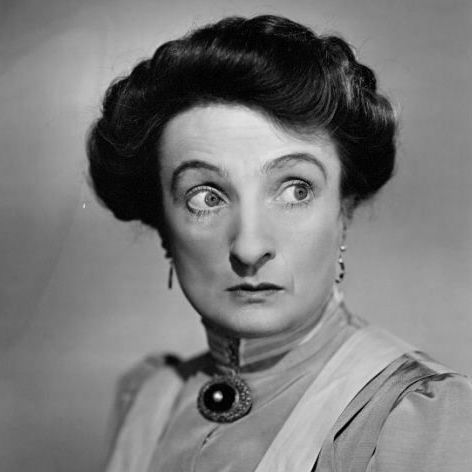
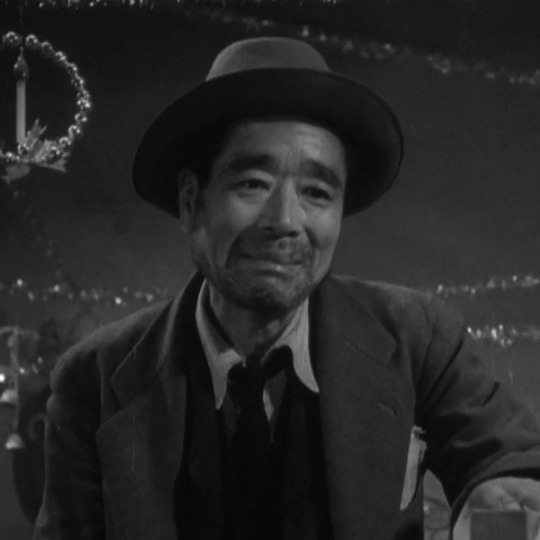
Una O'Connor (The Adventures of Robin Hood, The Invisible Man, The Bride of Frankenstein)—One of my favorite character actresses! While many people know her as the shrieking innkeeper's wife in The Invisible Man, I've always loved when she played a character who was a little more grounded (though that scream of hers is pretty iconic.) Her character of Bess is warm and loving towards Marian, but also tough and takes no prisoners. When they are captured in the forest, she comes forward to protect Marian with so much ferocity that Sir Guy (the villain) moves out of the way so quickly because even he doesn't want to feel Bess' wrath. She could switch from hilariously over-the-top to gently and sweet in the blink of an eye and she deserves a little more recognition! Also her hats in Robin Hood are ridiculous and I love them.
Bokuzen Hidari (Seven Samurai, Ikiru)—His Wikipedia article literally says "this guy is so scrungly," though technically they word it as "Hidari was famous among Japanese audiences for his portrayals of meek, downtrodden men." His job is wandering around going D: This certainly touches on the question of whether the actor himself is scrungly, or just the parts that he plays - in fact, this dude initially trained (in 1914) in Japanese opera and dance. At one point he suffered from gangrene, but "fearing for the loss of his livelihood, fought to keep the leg even though it meant using crutches for the rest of his life - except when performing." [link] Anyway, he made his film debut in the 50s and was one of Kurosawa's collection of remarkable character actors, generally as a scrungly little guy.
This is round 3 of the contest. All other polls in this bracket can be found here. If you’re confused on what a scrungle is, or any of the rules of the contest, click here.
[additional submitted propaganda + scrungly videos under the cut]
Una O'Connor:
youtube
she eats this:
youtube
The things this woman does with her face when she sees Frankenstein's creature. Your fave could never.
youtube
Bokuzen Hidari:
Here's Toshiro Mifune calling him out on his scrungliness:
youtube
You can see him at 0:17 here, going D: and at various points throughout that video looking absolutely miserable (for good reason).
youtube
96 notes
·
View notes
Text
ok so @mostlyintact and i were talking about the strengths of each of the sfth boys, and i think i was finally able to get some words out, so i thought i'd make a real post lol. a brief summary of each of their strengths, and examples of plays where those things are visible.
longish post, so i'll put it under the cut.
aj: he really shines in caesar and juliet. the narrative sort of revolves around juliet, and aj gets to really drive the story forward. his portrayal is iconic and natural and just so fun to watch. also, he's excellent in the oopsie daisy bulge, the grape depression, and priscilla's final petal: all plays in which he's got a whole lot of control over the way his characters are going, and gets some shining moments to drive the scenes forward in really compelling ways. he really reveals himself as a director and storyteller. also obviously death for a dollar, where he IS the actual narrator. to be honest, aj might be my favorite from an acting standpoint: his quick turnarounds and seemingly wild word associations and ability to grab a single piece of information and turn it into a whole story is both amazing and very similar to my own style of improv, and seeing him do it so well (even if he gets made fun of for being confused) is just. delightful. idk. his scenes where he's playing two characters at once (in grapression and oopsie daisy) might be the best of all the boys', to be honest.
sam: i think he does well when he's the center of a web of connections. his performance in, say, the evil make-a-wish kid is really fun, where the narrative is focused on him alone, but my favorites are things like the mystery of the midnight circus, the unrelenting aubergine, strange noises, or moist and magical. his characters feel more like an "everyman" in some ways, but always with a really unique personality. theyre relatable without being blank slates. excellent protagonists made better by their worlds. he takes the energy surrounding him onstage and sends it electric at the audience, using his surroundings to bring you in. it's really cool
tom: he is absolutely enamoring as certain archetypes. and he does an excellent job of making an impact with even the smallest amount of screentime. i'm always a sucker for abigail from the neighbour's under the bed--the monologue, the mannerisms--but a lot of that comes from a whole lot of overanalysis of her character, and that's not really relevant here. instead i'll say he's really really good at capturing the audience in death for a dollar, wild wet and worrisome, ballet on the battlefield, wine under the bridge, and priscilla's final petal. but tbh i could point to memorable scenes from almost every single tom character, he's so good at making his time count. his english degree comes out, ofc, which gives us those glorious tomologues, but also he can build up tension so naturally and make a silly story seem so real for a moment. sometimes that "oscar bait" moment can distract from the plot as a whole, but you don't think about it while you're watching him because he's so good at filling the space (to use a theater term).
luke: he's the absolute king of sympathetic characters. no matter how ridiculous the rest of the play is, you can always count on him adding a layer of humanity to his characters. it's easy to see in the milkman, of course, but also in divorces and teddy bears, wine under the bridge, toby's secret pocket, and the grape depression. his people are human, in ways that the others sometimes forget to be, and his storylines are impressively coherent. he seems to be the most concerned with getting the details right--sam nitpicks to get a laugh, but luke keeps track of details really really well, and does a good job of bringing in little things that make a story come together beautifully. more than anything, though, he is so good at building a character throughout a story and leaving you actually satisfied with what you got.
they each have really unique and somewhat specific strengths, but they complement each other so well. i think that's part of the appeal of sfth - they're so so comfortable with each other and find it so easy to read each other that you can tell they're having fun. it feels natural. they click, almost all the time, and even if things go off the rails they can pick up the debris from the crash and run with it. that's what i found really appealing about them--as someone who loved improv when i got to do it, it makes me wish i had friends close enough to do that with. it takes a ton of trust and a really solid relationship to do that, and i just. i just think they're neat :)
thank you so much mostlyintact, i can't come up with this sort of thing without prompting and i can't wait to see if you end up posting smth too 👀 love hyperspecific analysis
146 notes
·
View notes
Text
Mondstadt and Its Religious Implications
One thing that I will NEVER get over about Genshin Impact is the iconography used in the designs for Mondstadt and the implications it has. Now, don't get me wrong, as a rule of thumb, Hoyoverse has done a really good job in creating unique environments for Genshin's nations that more or less accurately portray a real-life cultural region. Liyue is based on China, Inazuma on Japan, Sumeru on India and Egypt, Fontaine on France (and Australia, if you squint), and Natlan on African and Native American tribes.
Mondstadt is based on Germany. More specifically, many of the designs and icons seem to resemble the Holy Roman Empire. Now, an important thing to note is that most of Western and Southern Europe was some denomination of Christianity at this time, with some exceptions due to various holy wars that occurred kind of all of the time. Anyway, the point is that the Holy Roman Empire was an established Catholic nation (and Germany still is predominantly Christian in modern-day). One thing about the Catholic denomination is that they proudly display religious symbols anywhere they can or in ways that they can carry with them, usually coming in the form of a rosary or a cross. When it came to specific places of holy worship, they would obviously spend no small amount of effort to completely embellish the place with gold, art, and symbols. Catholic churches are known to be the most extravagant of the denominations for a reason.
When a design team looks at The Holy Roman Empire, they will see this religious imagery everywhere. Namely, they will see the cross, because that is kind of, you know, THE Christian symbol. So it makes complete sense for them to note that down and underline it in red; for a mostly-accurate portrayal of the region they are taking from, a church and crosses HAVE to be included.
Places of worship are obviously not unique to Christianity, nor is the "cross" as a religious symbol even born from Jesus Christ. There are a few cases from different regions in which crosses and cross-like images were used for their gods. HOWEVER, with the specific cross that Mondstadt displays, and with the fact that not only is it based on Germany/Holy Roman Empire but that it is the ONLY Genshin region to use the cross in its designs (along with the usage of distinctly Christian/Catholic roles like nuns)... it is safe to assume that this is representative of the Christian cross.
You can see the issue we are about to have.
The fact that Mondstadt displays crosses as a religious symbol in CHURCHES and on the KNIGHTS' ARMORY (because most knights were historically Christian), that characters like Barbara are seen wearing in their designs, implies two things:
Crucifixation is/was a method of cruel execution in Mondstadt's history.
SOMEBODY of high esteem and worship had to be crucified, and thusly held up as the ultimate symbol of religion...
For the first point, while it IS still crazy to think that Genshin would imply this, I can, indeed, believe it to be true to canon. Why? Well, Mondtadt's history is already rife with the same abuses as Europe's actual history. From slaves to gladiator fights to rebellion to cruel monarchs, Mondstadt has not had a pretty life. Crucifixion honestly fits right in. I can imagine, in failed revolts against the aristocracy, those rebels who survived were later crucified. Other victims may be those who try to falsify gods or improperly worship Barbatos in a manner that the ruler doesn't agree with, those who commit treason, etc. etc..
Is it insane? Perhaps a little. But if we really get into it, Hoyoverse has done some crazy things with their lore so it's not really out of place, no matter how cruel the actual punishment is.
The second point is a little more complicated. Let's first rule off Christianity being a thing in Genshin - while you could consider the most of the nations to be monotheistic because they technically worship one god, the respective one of their nation, they most certainly do not obey/follow one god holistically, nor is there one mortal representative that god, nor is there a specific spirit that lives on in every believer who follows that god. So, there is no Holy Trinity; no Jesus Christ, no Holy Spirit, and there is no God, so to speak. No Christianity.
However.
One thing about Genshin Impact is that it takes from biblical mythology heavily, for some reason (and I say mythology because modern denominations don't consider the demonology stuff canon). For example, Paimon is the name of a demon who was more or less a servant of Lucifer (interpretations may vary). It is well known that the Archons are based on demons from biblical demon mythology. Even in the latest Natlan Archon Quest, Ronova, the Ruler of Death, looks unnervingly like Ophanim, the one everyone draws when they make "biblically accurate angels" or whatever.
Mondstadt accomplishes biblical references in two ways: one, that Barbatos, the demon, had four main kings/knights that rode with him. This can be seen represented in the Four Winds. Two, that these Four Winds can be viewed like how the Catholics would view a saint. Saints were, in simplistic terms, mortals who achieved great things and helped many people, and were then canonized after the death (usually). The church essentially declares them a Saint and worthy of worship. Idols and imagery are produced of these saints and hung like one would a cross or other images of Jesus Christ.
The most clear representation of that in Genshin would be in Venessa, who is a mortal who dies and then ascends to Celestia. She then becomes the Falcon of the West, one of the Four Winds of Mondstadt. So, a saint, essentially. Even though Mondstadt isn’t Christian, it certainly is Catholic.
The reason why I am going over all of this is to say that, well, it may not be necessarily implying that Venti was the one who was crucified. That is the popular opinion when discussing the crosses - that somewhere along the way, Venti was crucified. I am here to say that that really might not be the case. While the Holy Trinity is interpreted by many denominations to all be one and the same as each other, it is still a fact that it was Jesus Christ who was crucified, not God Himself. Jesus is the son, not the God.
Which is to say that it could be anyone, really. The most clear "child" of Barbatos that comes to mind is Venessa, who we could interpret as someone who could have been, at one point, crucified (though she was not). Rulers and people of high esteem also claim her titles and name like monarchs would claim holiness and divine right in Europe. Again, the problem with this is that she was not crucified and lived a very successful life post-rebellion.
The other option that comes to mind is the Unnamed Bard. He also could have been crucified. Even though we know he died in battle, it is not unreasonable that his corpse would have been strung up by pissed-off nobles upon the defeat of Decarabian. But, again, the problem being is that a. the timelines don't match up (Barbatos was not yet the Anemo Archon), and b. they won the rebellion so he still probably wasn't crucified.
So, it could be someone we haven't heard of, or someone deep in Genshin lore that I don't know about. Or, you know, perhaps Venti really was crucified. I don't know.
THIS is what Hoyoverse is implying. AND I DON'T LIKE IT (it's fucking hilarious).
#source: i attended church a few times when i was like 7#no it was not a catholic church#source: trust me bro#anyway just thought i'd add my two cents#i know people already know and that this game has been out for four years so obviously people have already talked about it at length#but this is just what i think#and i think that it is HILARIOUS#the effort is there from hoyo and i appreciate that#but since i happen to like history and know more about christian historical lore than i do for other religions and cultures#i notice the uh blaring issue with mondstadt's design#genshin impact#genshin impact analysis#barbatos#genshin barbatos#venti#genshin venti
98 notes
·
View notes
Text
An Honest Opinion on Cillian Murphy and his role as Jonathan Crane
This is gonna be long, so buckle up hroo hraas
Cillian Muprhy was the actor who played Jonathan Crane in the Nolanverse Trilogy. For many fans, if it wasn't btas, it was Nolanverse that introduced them to Scarecrow. Unfortunately, it's a pretty poor introduction.
Don't get me wrong, he's a good actor, but is is NO Jonathan Crane. He actually wanted to be Batman but those in charge saw his pretty blue eyes, became obsessed and basically threw away any previous idea of who their Scarecrow should be so Cillian could act in the movie.
The director goes on to host multiple interviews in which he fawns over Cillian's eyes. This is literally the only thing he has to say about Scarecrow. This is also one of the reasons you see them focused o so much in certain clips, Cillian was actually instructed to take off his glasses as much as possible.
Now, whats the problem? Well, Cillian is first and foremost way too traditionally handsome to be playing such a character, a character that was literally bullied for his looks in ever comic released prior. (and I do realize that handsome men can be bullied for their looks, but the comics only ever describe Crane as gangly and nerdy. Unlikable. Queer Fellow. Etc. And I honestly don't expect that kind of nuance when he was hired for his PRETTY EYES ) I don't even think the movie comments on his looks. Anyhow.
His roles in the movies, for me, are largely forgettable. The only iconic comment is "Would you like to see my mask" That's literally all anyone remembers. Oh and maybe the flaming horse, but that's never talked about by fans. So, it wasn't impactful
I doubt Cillian has even touched a comic book tbh. If he did, he's at least TRY to be scary. His costume---which largely isn't his choice--was uninspired and uncreative. A suit and a burlap mask with some maggots for some reason??? Boring. (Note: even the gotham actor read the comics. It's not hard to do some research into who you'll be acting as)
Compare that to comics out at the time, Year One, Batman Adventures, Batman Annual 19, even Long Halloween predated this movie! They had PLENTY to reference.
And what's worse? the fandom. Oh god the fandom. While I'm grateful many current fans got their start with the Nolan trilogy, they all largely have moved on to bigger and better canons. They're not who I have beef with. It's the Cillian Murphy fangirls. Not Jonathan Crane. Cillian. The tag is largely infested with them, and they often tag any and every photo of the man as Jonathan Crane. This does nothing for me, except annoy. I've blocked dozens of blogs for this. It's petty, sure, but I can guarantee you that tagging your Cillian pictures as every character he's acted as ever, does not mean you'll get more interaction. You'll get the opposite actually.
Do note, fanart and illustrated portrayals of Cillian are the one exception. Artists have taken his very boring interpretation and turned it into something awesome. Y'all keep doing you. You rock.
Cillian is not a bad actor, but he's a bad Crane.
-mic drop-
211 notes
·
View notes
Text
Interview with W Magazine (2024)
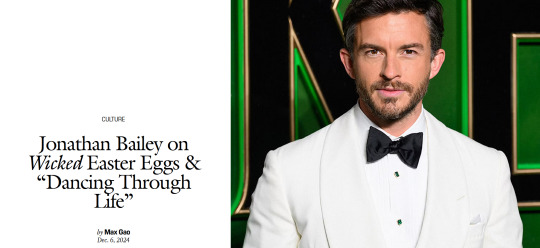
Jonathan Bailey has traveled the world to promote Wicked, but there was one person he was especially eager to share the film with: his 94-year-old grandmother. She nurtured his love for musical theater and encouraged him to pursue ballet as a child, thus shaping his career in the arts.
So, the day after Wicked came out in the U.K., Bailey hosted a private screening at a local cinema for four generations of his family. While sitting in between his nana (who had painted her nails green for the occasion) and his mom and dad, Bailey became overcome with emotion.
“It’s a miraculous thing to know that what it came down to is having parents who let me go to the local village hall, and a grandparent who let me play, dance around and sing, and be free at such a young age,” Bailey tells W. “If you can catch a passion and just ring-fence it at such a young age, you never know what it can amount to.”
Adapted from the iconic Broadway stage musical, the film, which is set before the events of 1939’s The Wizard of Oz, chronicles the friendship between Elphaba (Cynthia Erivo), the future Wicked Witch of the West, and her classmate Galinda (Ariana Grande), later known as Glinda the Good.
Bailey’s scene-stealing portrayal of Fiyero Tigelaar, the charismatic Crown Prince of Winkie Country, only reaffirms his status as a Hollywood triple threat. In fact, “Dancing Through Life,” the earworm that serves as his character’s introduction at Shiz University, just cracked Billboard’s Hot 100 charts this week. (“That’s amazing. Do I get a certificate? What happens now?” Bailey quips.)
Bailey began rehearsing for Wicked in 2022 while shooting Fellow Travelers, the groundbreaking Showtime limited series that earned the 36-year-old his first Emmy nomination, and the third season of Bridgerton, the smash-hit Netflix romantic drama that made him a household name. Speaking on a video call from London in early December, the British star reveals that he is in the middle of reprising his role as Viscount Anthony Bridgerton, who is expecting his first child with wife Kate Sharma (Simone Ashley).
“There’s such an important relationship with the [Bridgerton] bros that has been developed over the series. Season four is going to be Luke [Thompson] and Yerin [Ha] being absolutely extraordinary, and there’s a whole plethora of new characters coming in,” Bailey says. “It’s so nice to come back, and it’s about celebrating the romance stories we’ve had and digging into the ones that are starting.”
Patience will have to be a virtue for Wicked and Bridgerton fans alike; the second half of the former, which Bailey coyly describes as “rich, bruising and hopeful,” will premiere next November, while the latter will debut in 2026.
How did you think about building your own interpretation of Fiyero?
The starting point was “Dancing Through Life.” He creates chaos around him, like he does in that song, because he’s got to match the chaos that’s going on inside. The challenge that I felt was the trope of a cool caddish prince. He’s deeply unnerved by stillness and adhering to rules and structure. That is probably a sign of someone who’s never really experienced love. When you see someone causing that sort of disturbance, it’s usually because they’ve never felt seen. An organizational psychologist, Adam Grant, sent me a message saying, “It’s a masterful portrayal of superficiality masking depth.” Out of all the things I’ve heard, that is the thing I’m going to get printed on a T-shirt.
The Shiz library scene was inspired by the work of Fred Astaire in Royal Wedding. What did you want to convey in those moments?
Fiyero has to come in and change the physical language and the emotional landscape of that school in one number. His fluidity, ease, and elasticity speak to his ability to maneuver and avoid. He’s quite avoidant. He has these bright, shining moments with everyone but never really allows the other person to land it with him. For those who understand the physical language of Fiyero, there are many Easter eggs and nods to what happens to him later in the story.
Fiyero is at the center of a love triangle between Elphaba and Galinda. What do you think he sees in each of them?
The brilliant thing about the film is that these slightly trivial tropes mask extraordinarily deep and shifting understandings of social experiences. The superficiality, the privilege, and the sense of easy chemistry make sense with Glinda. But I feel like he’s yearning for something more, and, as Elphaba sees, he’s unhappy and depressed. Fiyero and Elphaba can click in terms of the way they sing, dance, and move together. Elphaba has a calming presence on Fiyero and allows him to be himself. It’s a real privilege to meet someone who sees you for who you really are.
Are there any songs from the second Wicked movie you are most excited about?
“No Good Deed”—I cannot wait to see that come together. And “Thank Goodness”—it’s just such an incredibly operatic, Wagnerian opening. We know how brilliant the girls are, and I’m so excited to see the tonal shift that will inevitably happen to get to the end of the story.
You’ve been leveraging the success of projects with massive, global appeal (Bridgerton, Wicked, the next Jurassic World) to return to the theater (like your next role in Richard II).How have you been balancing these big tentpole franchises with projects that feel more niche and intimate?
I always lead with joy, and I’ve never accepted a job cynically. It goes back to this instinct—it feels like romance—where you have butterflies in your stomach and clarity of thought. I go back to the stage because I want to get better—and I want to be the best I can be. The best performances I’ve ever given on screen have been directly after coming off stage, where you hone your craft every single night. It’s brilliant, joyful, academic, and exhausting.
I’ve read more scripts in the last four years than probably in 20 years of working. It’s amazing to get sent scripts that you’re like, “This is absolutely brilliant. It’s not quite right for me, but I wonder if I can help that get made.” I’ve got a producer's hat that’s been popped on a few times in the last year, and I’m sure it’ll be coming out to play soon.
I want to keep working until something like Fellow Travelers isn’t seen as niche. We’re only on this planet for a short time, but if Fellow Travelers can be a mainstream show by the time I’ve finished my innings, I’d be very happy.
The last time Bridgerton viewers saw Anthony and Kate, they were on their way to India to meet with Kate’s family. Now that those characters are married, what are some of the new layers you’ve found in their relationship?
Anthony and Kate are these two planets that have always been in orbit of each other, and they finally come together. But then, what is life beyond [their courtship]? What’s so interesting about Anthony and what I so enjoyed in his season one arc is his relationship with duty and the power that he wielded over Daphne and his family, the isolation that he felt, and the anger that ensues because of [the passing of] his father.
I always said that you want Anthony to smile, and he does with Kate; he’s found his soulmate. In season three, they have that playfulness and, for the first time, they disregard anything that’s going on around them. They were the heart of every bit of drama and complication and, my God, how dramatic it was! Now suddenly, they’re having the time of their life, getting to play games again. They’re having a baby—everything they’ve ever wanted. What’s brilliant is to see how there are elements of yourself that you can’t grow out of. So, maybe, we’ll see hints of Anthony from season one.
Source
#jonathan bailey#jonny bailey#interviews#interviews:2024#w magazine interview wicked#w magazine#max gao#wicked#bridgerton#NEW!
101 notes
·
View notes
Note
You said in your ancient Sandman blog post there’s a way to read Death as the villain of the comic. Would you elaborate on that?
Can we distinguish her cheery pragmatism from a complacent nihilism? It may be poetically apt for Death to have the manner of a good service worker, a cute (but not conventionally sexy) barista, the better to draw us in to her realm; a comparison to Gaiman as crowd-pleasing author, crowd-pleasing because of his charmingly "harmless" put-on, and comfortable in the routine exercise of his vocation, behind which he is monstrous, suggests itself. But if Gaiman were more spiritually serious, or spiritually serious at all, he would have shown what hides behind Death's human-flattering veneer, would've given Death a Krishna-reveals-himself-to-Arjuna moment, as Alan Moore might have. (This point applies to the portrayal of all the Endless, but it would have been most damaging to Death qua the series icon and mascot, as Gaiman's canny projection of the self-image of the female audience he pursued.) This unintentional ambiguity—pragmatic cheer as the camouflage of lethal power—exists on the plot level, too. I understand Gaiman wished to use the structure of a Classical tragedy, but still, his more novelistic literary mode gives us free rather than fated characters. On her first appearance, Death chides Dream for not asking for her help—but once the situation becomes clear, why doesn't she do anything? Why does allow Desire's plot to unfold to the bitter end? Death enframes Dream's story; she is essentially complicit in the scheme against him. The rules governing the Endless seem mutable enough—Destruction leaves, Delight becomes Delirium, and, indeed, Desire scripts Dream's doom—which means that Death could attempt to avert the tragedy. But why should she? The whole narrative tends toward death, and thus toward Death. The moral of the series is that Dream must change, but fan-favorite Death remains throughout the most static character, and morally undamaged by her stasis, or so the narrative implies. She enforces the status quo in the series' universe: a cute authoritarian. Behind her mask is Gaiman's own complacency and ruthlessness; the mask itself is his preferred erotic type, a spiritedly young but ultimately docile woman.
56 notes
·
View notes
Note
Which translation/adaptation of JTTW is best for beginners? Besides maybe Dragon Ball (doubt it counts)
Heh yeah I mean it’s a great anime but I don’t think you would have a good Xiyouji experience per se. Usually, I see Dragon Ball used as a gateway for people to THEN read/watch Xiyouji content but like it doesn’t really have much Xiyouji plot wise even if the characters are homages.
I would say that if you want an ACCURATE Xiyouji experience then you can choose between three shows. That being the classic 1986 which is many people's first Xiyouji experience as the cast is so iconic you see these designs in dozens of movies and their influence in future performances. The second is more family-friendly but still one of the most charming and fairly accurate portrayals is the 1999 Xiyouji animation, I would say far more younger people's first piece of media and without a doubt the best Xiyouji animation series thus far personally. That last I would suggest is 2011 Xiyouji series which is one of the more newer shows and I would say I would that if you want more modern effects and humor than this might be a preferance to the 1986 version. They both have their own charm but just depends on what you are looking for!
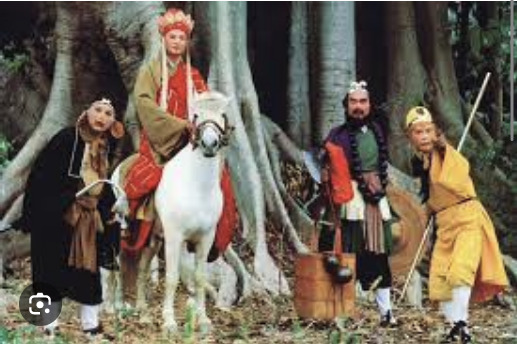
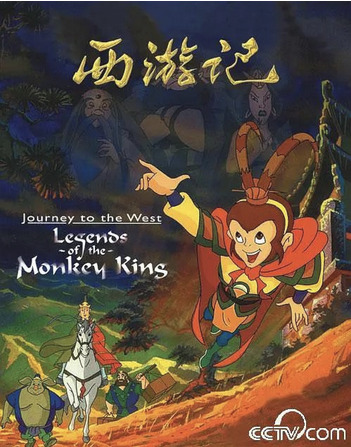
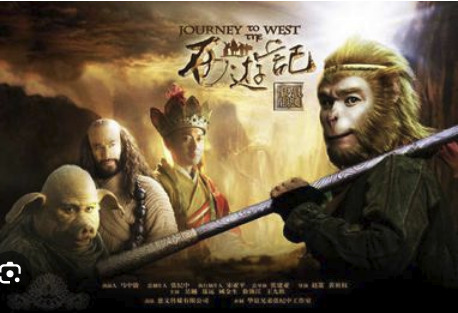
Now while these are the most accurate there are some Xiyouji media I would still recommend even if they take far more liberties.
This without a doubt being the 1996 tv series. This is portrayed as more of a drama but between the characters and the pure HEART AND LOVE that is in this show that you will be falling in love with the characters. It vaguely follows the Xiyouji monster of the weak formula but taking far more time to humanize each enemy and having our main cast overcome not only physical obstacles but also their own emotional obstacles as well. Fantastic show. Another is Chinese Odessey (please note this is a two part movie)! This does NOT follow the journey at all instead more of an introspective of the character Wukong. This is more of comedy but this is a cult classic as one of the first romance films with Wukong to show him as more of a complex hero which was a deviation from how he was portrayed in media for years as this point. This movie is silly but it is actually very heartfelt and makes you feel for these characters's plights. If you don't know Xiyouji I would say you will be confused, but you can fall in love with these characters anyway! Whil I can't suggest Dragon Ball I can suggest another Son Goku from My Son Goku! This is a Japanese production but the animation is so fluid and the characters are not only charming but there are some heart reaching scenes in this very cute art style! I would say give this a watch if you enjoy anime but also can appreciate angst even in a cute style.

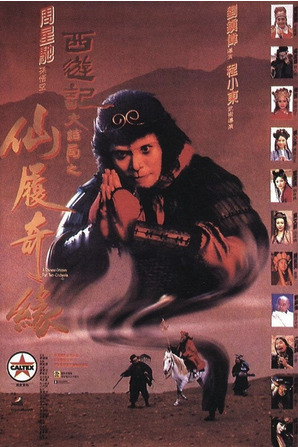
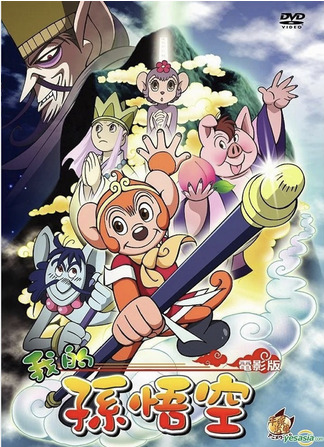
If you are looking for more just great Xiyouji movies that you can pop in and a fantastic one is the 2015 Hero is Back! This was the Wukong come back animation-wise since 1999 and a lot of people first Wukong in the big screens! Does take liberties story wise as we don't see Sha Wujing or any of the journey really, but the HEART and soul of Sun Wukong is there. Another great one is just watching the first and classic 1961 Havoc in Heaven! This was the staple of Wukong iconics for decades and even now you see this Wukong in commercials! This is just a beautiful art style and without a doubt charming and feel good vibes. This one is surprising but actually Nezha Reborn where Sun Wukong actually makes a cameo appearance, but I hear so many people got into Xiyouji just cause how much they love him. So while it's not Xiyouji I would say give it a watch if you are a die hard Sun Wukong fan.
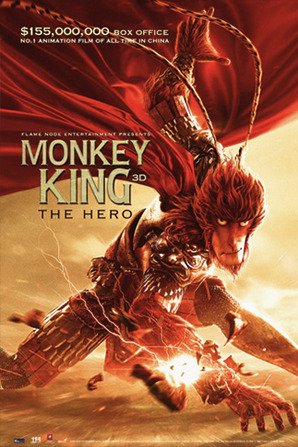
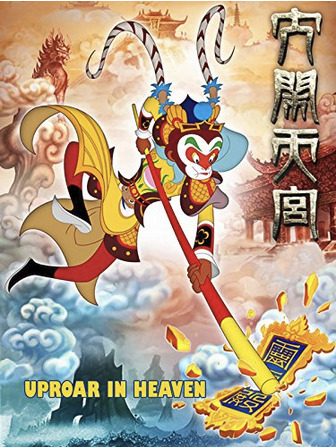

There is also Monkey King Reborn which while less known I still think is wonderfully popular and shows both great animation and also how all three characters of Wukong, Bajie, and Wujing interact in a movie. There is also Monkey King 2 which I know that usually I would say which the first movie but honestly the second movie is my personal fav. You don't miss much without watching the first as the second starts right at the begging of the journey and we are introduced to some of the best designs for these characters in my opinion. This last one is kinda of a hit-or-miss but Conquering the Demon! This one follows Sanzang as a demon hunter in a loosely based story of him finding his disciples, each more monstrous than the last in a dark-comedy! If you enjoy Stephen Chow films then you know what kind of humor you are going to get but it is new take on Xiyouji films in a unique but still entertaining manner! They really make you feel for Sanzang as a character and one of the best humanizations of him really as a man still learning about the world himself.
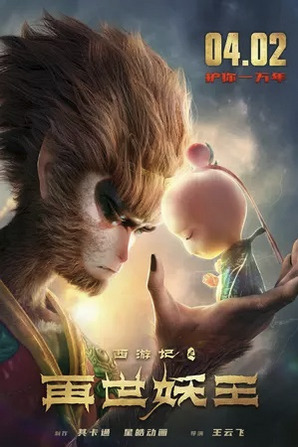

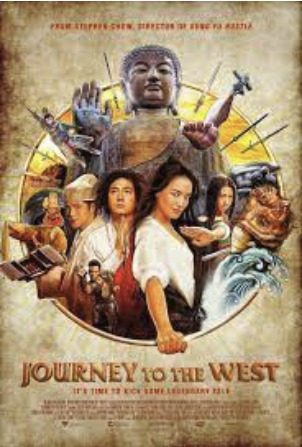
There some other that are great but I would suggest more on a second watch or if you know the story more! Saiyuki / The Great Alakazam was the first eng dub saiyuki piece of media that came to the USA and still had a lasting influence with the beloved character Rinrin! There is also Monkey King 2009 that only looks at the story BEFORE the journey, adding so many elements to Wukong's childhood and his relationship with the Six Eared Macaque. I would also suggest the Monkey King Netflix Movie as while it is fast-paced it really makes you understand how dangerous but also how complex Sun Wukong is. I think it was a charming movie so give it a watch!. Last is Immortal Demon Slayer! This movie was based on a web novel that was extremely popular in the early 2000s which was based off Chinese Odessey funny enough! This is a movie I would suggest if you know Xiyouji already but it such a tragedy I have to share if you love angst.
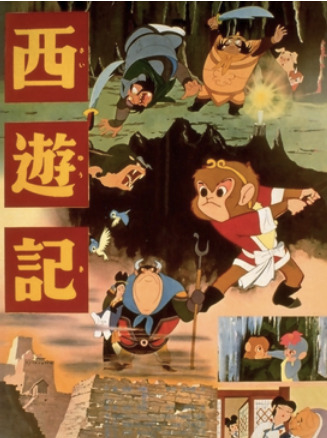
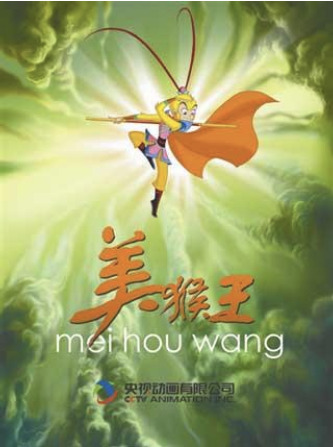
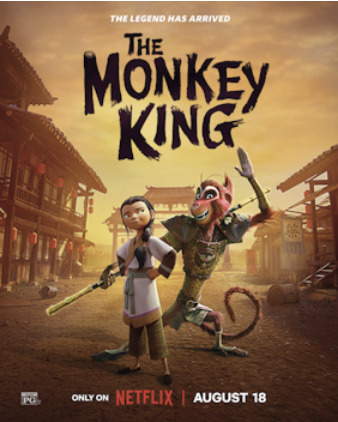
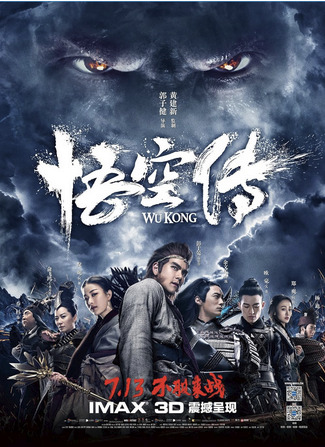
If anyone wants to share their what was their first Xiyouji or their favorite Xioyuji please let me know!
#anon ask#anonymous#anon#journey to the west#jttw#xiyouji#sun wukong#ask#journey to the west 1986#jttw86#jttw96#jttw99#jttw15#jttw17#Havoc in Heaven#大鬧天宮#Uproar in Heaven#Monkey King#大闹天宫#Immortal Demon Slayer#悟空传#Bio of Wukong#Monkey King Reborn#西游记之再世妖王#The Monkey King#美猴王#Alakazam the Great#西遊記#Saiyuki#Journey to the West: Conquering the Demons
273 notes
·
View notes
Text
Welcome to the King of the Claudes Tournament!
A silly little place with polls about our favorite silly little actor, Claude Rains!
Prior to the creation of this blog, we were shocked (shocked!) to find that across the Tumblrverse, time and time again, Claude Rains would be beaten by fearsome opponents in the race for the crown of various hottest/scrungliest/what-have-you titles. So, we've decided to take matters into our own hands to give some well-deserved love to this beloved character actor through various polls!
The King of the Claudes Tournament has begun! Polls will be posted once daily at 7PM EST!
Round Four begins on February 24th @ 7PM EST!
Our list of active polls can be found HERE or through our #round four tag!
We're going to be matching up all (and we mean all!) the roles Claude has played over his decades of acting to decide which one of them will be The King of Claudes! All characters(we're talking the famed Captain Louis Renault, the mad scientist Jack Griffin, as well as other lesser-known portrayals like the kindly Mr. Jordan and the cankerous Professor Benson) will be submitted by default and it's up to the voters to send in their favorite propaganda(pictures, GIFs, stories, video clips)!
Past polls can be found HERE, HERE, and HERE or through our #round one, #round two, #round three, and #redemption round tag!
As of this time, we're only going to be looking at Mr. Rains' film career, so no TV, stage, or radio portrayals will be in the running this time around. This goes for propaganda, too, so please don't send in entire radio broadcasts as propaganda(we know they're great, you don't have to tell us!).
FAQs
Who's Claude Rains? Great question! William Claude Rains was a British screen/stage/radio actor who was primarily known for his character acting and there was never a role he couldn't seem to play (When asked about his versatility as an actor, he replied that he "can play the butcher, the baker, and the candlestick maker"). He was a frequent collaborator with stars such as Bette Davis, Humphrey Bogart, and Cary Grant, among others and worked with directors such as Michael Curtiz and Alfred Hitchcock. He was nominated for four Academy Awards for Best Supporting Actor and won a Tony Award for his role in Darkness at Noon. Oftentimes, people know him as "that guy" when talking about his roles in iconic films (such as Casablanca, Mr. Smith Goes to Washington, The Invisible Man, and Lawrence of Arabia). He also served in WW1 (even fighting alongside individuals such as Basil Rathbone and Sir Cedric Hardwicke) and called himself a "gentleman farmer", often returning back home to tend to his farm in between shooting for films. Also, if you search up the term character actor, you see a lovely still of him in Sons of Liberty!
Why is this blog a thing? Because it has been a deeply saddening affair to watch Claude Rains get stricken down during various polls (and we mean every. single. one. [although, we had a grand Round One victory over on @vintagetvstars!]) and we feel he deserves to win something! Also, this blog hopes to bring more recognition to his great work! We'd also like to thank @hotvintagepoll for directly inspiring us to create this blog and if you haven't already, please go check them out!
Who should I vote for? We are judging the portrayal of the character here, not the characters themselves. Claude played a lot of baddies (some worse than others) but we are not judging how good or bad a character is morally, only on the portrayal. Who will be the winner? That's up to you! Which of these Claudes deserves to be crowned the King of them all? What makes them the King in your eyes?
How can I submit propaganda? Before the tournament starts, we will be accepting propaganda through a Google Form and we will be accepting written and visual propaganda(pictures, GIFs, and video clips) to go along with each character. We're also only looking for propaganda from the particular film a character is in, but we're open to headshots/professional stills from the time it was filmed! Please only submit propaganda for one character at a time and don't hesitate to send in multiple submissions! We'd like for each character to have propaganda, so go nuts in your submissions! Tell us why you think your Claude should be crowned King of the Claudes! Again, we are not looking for character submissions, only propaganda for that character! Don't fret, every Claude from a film will be submitted! Here is a list of all the possible characters to send propaganda in for!
Additional Propaganda? We encourage additional propaganda through our ask system or by tagging us @kingoftheclaudes. As previously stated, we will only be accepting/boosting propaganda from Mr. Rains' film career, so no GIFs from his various Alfred Hitchcock Presents or radio snippets from his various Lux Radio Theatre broadcasts. We also tag each film and each Claude in an effort to make things easier when searching through the taglist.
These polls are mean to be short 'n sweet (much like Mr. Rains!) and not meant to be taken seriously! We just want to have a good time enjoying the many works of Claude Rains and all views expressed in propaganda and tags are not our own!
The tournament is scheduled to kick off on Sunday, November 10th (coincidentally[or perhaps, not] Claude Rains' birthday!) and will compile of 28 matchups of 56 characters (since the character of Adam Lemp appears in three movies [Four Daughters, Four Wives, and Four Mothers], we are combining all his appearances into one and, contrary to Wikipedia's listing, Mr. Rains did not provide the voice of Jacob Marley in Scrooge. We are also opting to omit the character of Clarkis from Build Thy House, since there is limited knowledge on the film available, as well as omitting the character of The Mayor from The Pied Piper of Hamelin, since despite it later being released in theatres, it debuted as a TV special). We're tentatively planning on scheduling 5 polls a week to make this tournament last longer and each poll will run for one week!
What happens after the polls end and the crown is handed off? We may be open to doing a series of mini-polls, such as 'Best Father', 'Best Villain', 'The Battle for Science', 'King of TV Land' and 'Historical King of the Claudes' among some others. If you have some more ideas, let us know!
My question isn't answered! Feel free to send in an ask but always check the FAQ before, since your question may have already been answered!
We hope you enjoy our fun little polls and wish all the Claudes the best of luck!
(sneaky @tournament-announcer tag and a bonus Claude as a thanks for reading this far! :))

#claude rains#kingoftheclaudespoll#polls#kingoftheclaudes#tumblr polls#tournament poll#classic hollywood#old hollywood#poll#vintage hollywood#tumblr poll
95 notes
·
View notes
Text
On media portrayals of older women
Commentary on Lydia's characterization in Beetlejuice Beetlejuice. 🕷
This post was originally a response to a post from two months ago, but it got so big (and also I kinda moved away from the topic a little), I decided to make it its own post. It's a long ramble, basically, about my feelings around how women over 30 tend to be written and how disappointing it often is, especially now that I am a woman over 30 myself.
Before I get to Lydia and my issues with how she was written in BJBJ, I just want to say something. There is a blatant unwillingness to represent an older woman who isn't a mother or, at the very least, married or divorced, and often those women who are depicted as individuals outside of these roles, tend to be either toxic or unhappy characters (Cruella De Vil totally came to mind when I just typed that 😆 But even Cruella is married in the original story). As a matter of fact, the ex-wife or divorced older woman is often depicted as a cruel, bitter, or even evil woman (Miranda Priestly form "Devil Wears Prada" came to mind. Hey, another iconic fashion industry character lol). Single older women are often also depicted as "ugly", or flat out scary characters (Miss Trunchbull in Matilda came to mind).
It's like for many screenwriters it's impossible to visualize a mature woman who isn't or hasn't been married, and is childless.
The issue is not that they are given these roles; the issue is that their character arcs often seem to revolve around these roles and their identity is very focused on being either the mom, the wife, or the ex-wife. More often than not, female characters over 30 that are good are usually moms or struggling wives, and their identity is confined or greatly centered around her role as the mother or the suffering wife. (Chances are, if she's happily married, she's either not the protagonist or the story is over 💀). And if it is not centered around these, then motherhood is something adjacent to the story in some way, shape, or form.
Using the first "Beetlejuice" movie we have an example of a happily married woman in a leading role, Barbara Maitland. She's not an older woman, per se, but she is a happily married woman in a leading role. But what is one of her main concerns as a character? She can't have children. So she does have a motherly-adjacent struggle. At least Adam accompanies her in this story thread and it isn't just a struggle Barbara alone is facing; both of them are pretty balanced as far as their struggles go in "Beetlejuice". (I could have also used Delia as an example here, but she isn't exactly the main character as Barbara was in "Beetlejuice". That said, she is both a mother and wife.)
I'm pretty new to the Beetlejuice fandom (as in I was a fan who watched the movie a few times a year around Halloween, but never actually interacted with fandom or analyzed anything, until I watched BJBJ and became totally obsessed), and as a relatively new fan who has been here since September 2024, I'm not sure what the expectations around Lydia's future were throughout the years in the fandom. But, I'm positive a lot of fans never considered Lydia would choose to get married and to a pretty regular guy at that at some point and become a mother. I'm sure many fans shared Winona's idea of older Lydia being a goth spinster, living a pretty unconventional, but happy life, just doing her thing. She might have gone into photography and kept interacting with the dead and being her goth, "strange and unusual" self.
So it must have been pretty shocking to see that older Lydia is not only a struggling mother, but she is also anxiety-ridden and in an abusive relationship with some normie guy.
Lydia at least has something that separates her identity as an individual from her identity as a mother, in her show, but it's made clear that getting into making the show was considered by her as "selling out", a sentiment that came up in her conversation with Delia. I wish they would have gone into that a little bit more, because it's not entirely clear how Lydia felt about the show exactly and what her reasons were to do it in the first place. Lydia's interest in photography from the first film, and subsequently from the animated show as well (meaning this was an inherent and very characteristic part of her), is non-existent in the sequel.
While it's understandable that "life happens" and people just change over time, and a life of seeing and interacting with all sorts of ghosts must have taken a toll on her, Lydia's characterization was considerably far from the person she used to be, and it feels like a lot of it had to do with her mother role.
I know a lot of fans also appreciate this, too, don't get me wrong; Lydia as she is now is relatable to many women's experience, but what I'm getting at is that a choice was made to write older Lydia like this, and that choice is the same treatment that's given to too many older female characters in the media. They chose to make her a struggling mother, is the point I'm trying to make.
Her character has also become more reactionary; she isn't exactly in control about anything. Even making her show appears to be a reactive decision, too, rather than something she did because she genuinely wanted to. She's even taking medications to get through the day when she starts seeing ghosts (Nadja disappears after Lydia takes the pills, so one can assume she takes these pills to quiet down her psychic abilities and stop seeing ghosts; Rory's comment in the bathroom also supports this).
Lydia is indeed, overall, unhappy, and she has been for a long time. Not saying this is a bad thing; stories need conflict, and it would have been strange if she was living her best life at the start of the film. After Charles funeral we confirm that she wasn't exactly happy when Richard was around, either ("our relationship was over long before the accident", strange thing to say to Astrid when she's questioning her about why she cannot see her father). Things seemed to have ended amicably between them, but it looks like Lydia was not happy in that relationship by its end.
Lydia only seems to take control when her daughter is in danger, so that which spurs her into action is more linked to her mother persona over any other conflict that's more directly linked to her as an individual. If it wasn't for Betelgeuse's intervention, she might have even ended up marrying Rory, who, not only did she not love, he was also using her and being emotionally manipulative and abusive.
I know Lydia at some point became affected by seeing ghosts every other day through her life, as evidenced by the pills, but (and this is something I talked about before here) the way they ended the previous film, there was nothing to indicate that Lydia was in a downward spiral or that seeing strange things and dead people affected her negatively in any strong, life-altering way (unless Lydia was pretending to like the dark stuff before, and by the end she's more herself and admits to not like the creepy stuff; she does reject dissecting the frog in her science class, but then again, she asks the Maitlands to levitate her and pretty much do a ghostly possession in the house for the "Jump in the line" scene. But I digress. Lydia's character arc in the first film is an analysis for another post).
Moving on, Lydia's brief experience with Betelgeuse in the first film also does not justify her current emotional state for the reasons stated above and in that post I linked. Losing Richard also doesn't seem to be enough of a reason to have created the emotional issues Lydia is struggling deeply with in BJBJ, and it does seem that the movie pointed at that, but it was poorly done, when Lydia told Astrid she didn't have a relationship with him long before he passed away; she also didn't have a strong reaction to seeing Richard in the afterlife.
Whatever happened to Lydia that led her to this current state wasn't properly explored, is what I'm getting at, because the film decided to focus her character struggles mostly on her relationship with her daughter, over her own personal conflicts as a separate individual. Lydia as the suffering mom, struggling to connect with her daughter was the focus of her arc. Did we ever get to know exactly why she was willing to marry Rory despite clearly not loving him? (she even seemed disgusted by him kissing her and when he tried to kiss her lol).
Was it because she thought he was her only chance at being happy again? Was it because she thought she needed to be married for Astrid, to rebuild their family? Lydia's actions were entirely steered by Rory; he emotionally manipulated her so much, he made her believe she had feelings for him and start a relationship with him, even. Maybe it was him, the one who convinced her to start the show in the first place, to take advantage of her psychic abilities (which he totally believed to be bullshit, anyway, but he thought he could use her delusions/fake claims to attract fame and money), he was her producer, after all. (Actually I think it was him who convinced her?? Was she making her show before meeting him? Lol I totally forgot this bit. Fill me in because I've only watched the movie twice.)
By the end of the film, ironically, Lydia takes more control for herself when she sends Betelgeuse away (and I say "ironically" because, without Betelgeuse she would still be stuck in the same toxic situation she was with Rory. In fact, things would have gotten much worse as Rory would have gotten away with his plan. She also had no issues handling Betelgeuse during all scenes they had together; she would even raise her voice at him and act exasperated with his behavior--that is not typically how a person who is terrified or traumatized by someone acts around them, but ok...), and she makes a choice to be more focused in her life, assuming she did quit her job, which is up for debate, depending on when the dream sequence started.
Without Betelgeuse, Lydia would be stuck in a terrible relationship, where her life would have been ruined, and she would have also lost her daughter on Halloween night when Jeremy used her to get his life back. So it's really strange a choice (and poorly executed, again) to have Lydia's character resolution be sending Betelgeuse away like she's finally confronting some deep-rooted fear or trauma, when her character really wasn't explored individually all throughout the movie to showcase in what way exactly did her brief interactions with Betelgeuse over 30 years ago might have crumbled her emotional stability to that degree. The movie isn't clear if her depression and anxiety are related to losing Richard and therefore that's what she needs to heal from; or if it's more related to her past trauma around Betelgeuse, and then, that's what she needed to heal from.
There really should have been more of a focus on her as an individual apart from her struggles as Astrid's mother for her character to really have a good payoff at the end. And truly, if facing Betelgeuse was going to "fix her", then she's back at square one when he shows up on her bed at the end. Lydia's character and story are incomplete. More reasons why we need a BJ3.
What's truly going to heal Lydia is her finding herself again, as just Lydia; not the mother or the TV presenter. And she must get there herself, not have it all fixed for her by Betelgeuse yet again or another external force. She has to make a choice for herself. They need to show her picking up her camera again, and yes, enjoying the "strange and unusual". She needs to embrace her otherness and be herself again.
(And if she doesn't want to be alone... she shouldn't go after a guy like Rory or a normie. She needs another weirdo like Richard who loved scary movies, or, ahem, Betelgeuse, who has already proved he loves her more than any normie ever could.)
I can't stress enough how disappointing it is that mature women are mostly presented as moms or wives or even grandmas, without dreams and motivations of their own that are entirely separate from their (societal) roles. Mature men can be out there living adventures and doing all sorts of things, like James Bond for example. Meanwhile women are either divorced, mothers, wives, grandmas, aunts, etc and these roles are a huge part of what defines them as characters. And if it doesn't define them, they still are moms, wives, ex-wives, or grandmas. It's rare to see a single older lady doing her thing and being just a character and like, falling in love and going through a satisfying arc that has nothing to do with having kids, or dealing with estranged kids, etc. At least Delia was out there doing her thing in BJBJ; she was doing what she loved, while still being a mother and a grandmother, and a loving wife/widow to Charles. She was a realized character. And that's what I want to see, you know? I don't mind seeing an older female character who is married with kids (and even grandkids!), as long as she is also a fully realized individual when her character arc is wrapped up at the end.
If Lydia being behind the camera instead of in front of it in BJBJ is representative of her feeling lost in life, and her being in a toxic relationship and almost saying yes to someone she doesn't love or even remotely fit in with, then healed Lydia should be behind the camera again in BJ3, and saying yes to someone she does love and fits in with by the end.
I definitely want to see a Lydia who is more than Astrid's mom in BJ3; a Lydia who isn't easily manipulated and stepped on, and who has a firm grasp on who she is and a love for who she is. Yeah, I totally want her to end up with Betelegeuse (edit: And I am writing a post about why they are perfectly matched to complete each other's character arcs), but I also want to see her fully realized outside of the mother and (potential) wife roles.
#Lydia Deetz#Beetlejuice#Beetlejuice Beetlejuice#Beetlebabes#Beetlejuice x Lydia#Beetlejuice meta#things I write#This post was in my drafts for around two months 💀#But this is still not the long post I was talking about earlier#That one will take longer to complete#text post#long post for ts
57 notes
·
View notes